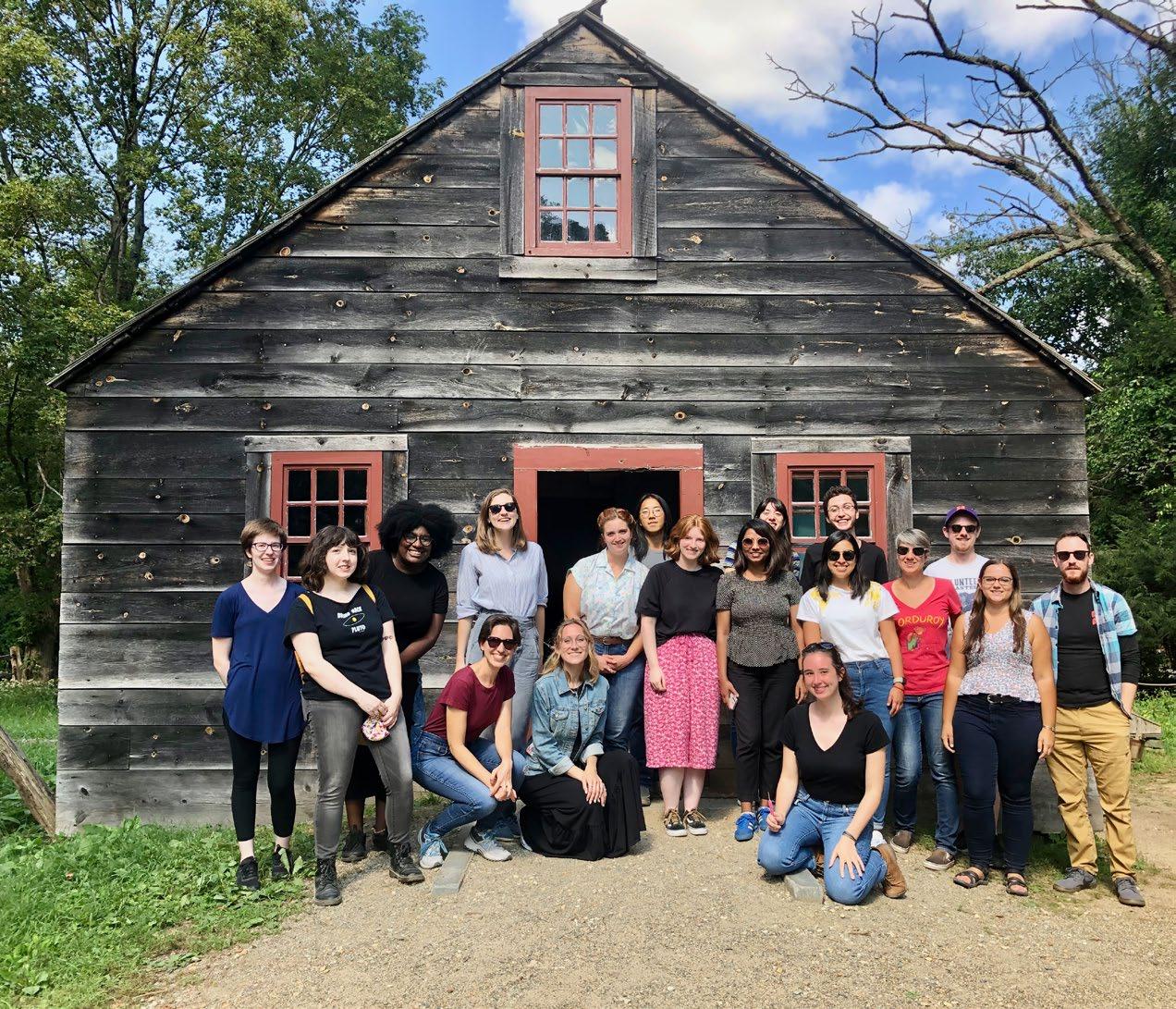PAST PRESENT & FUTURE
Department
of History / 2022 R eport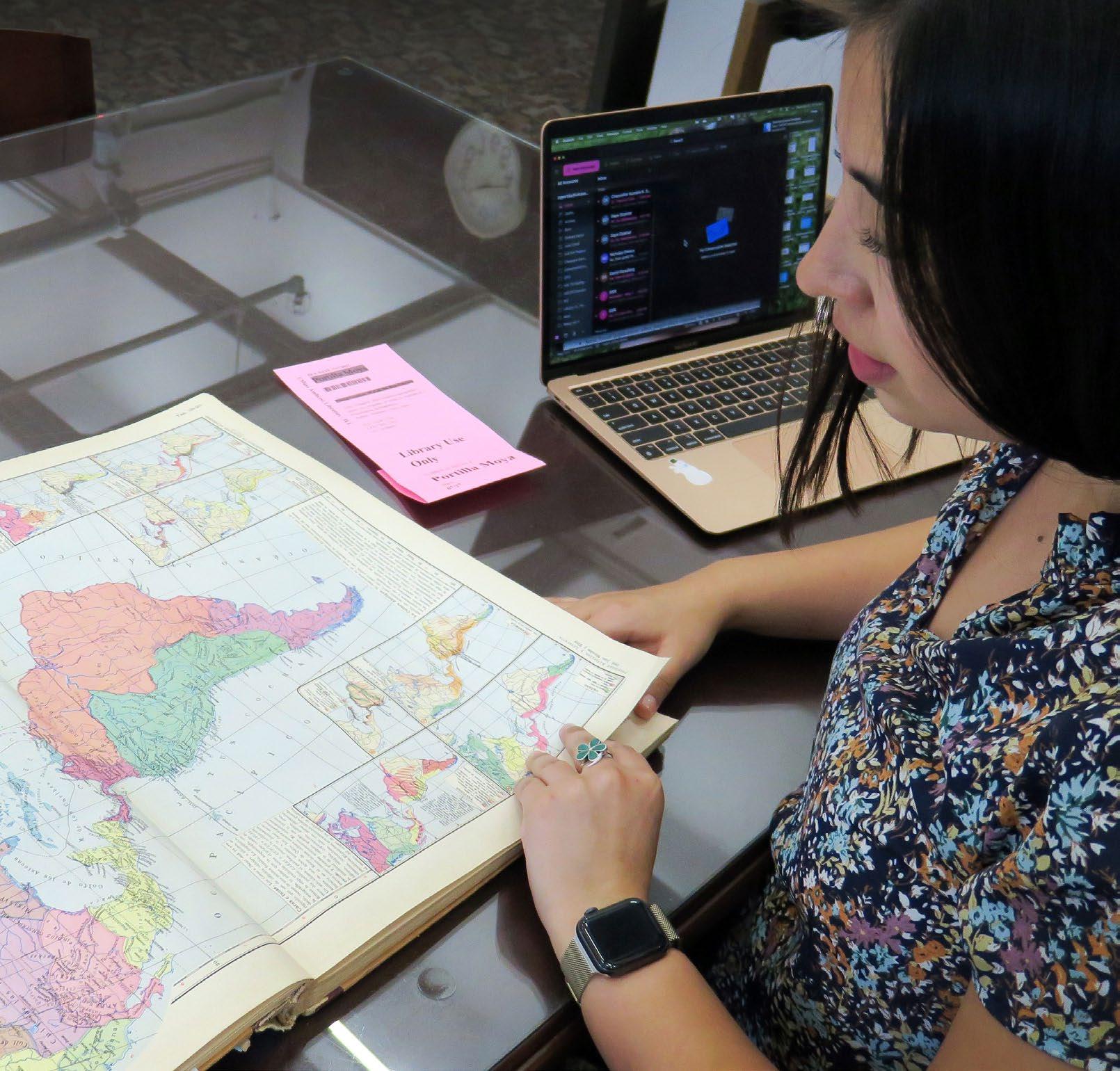
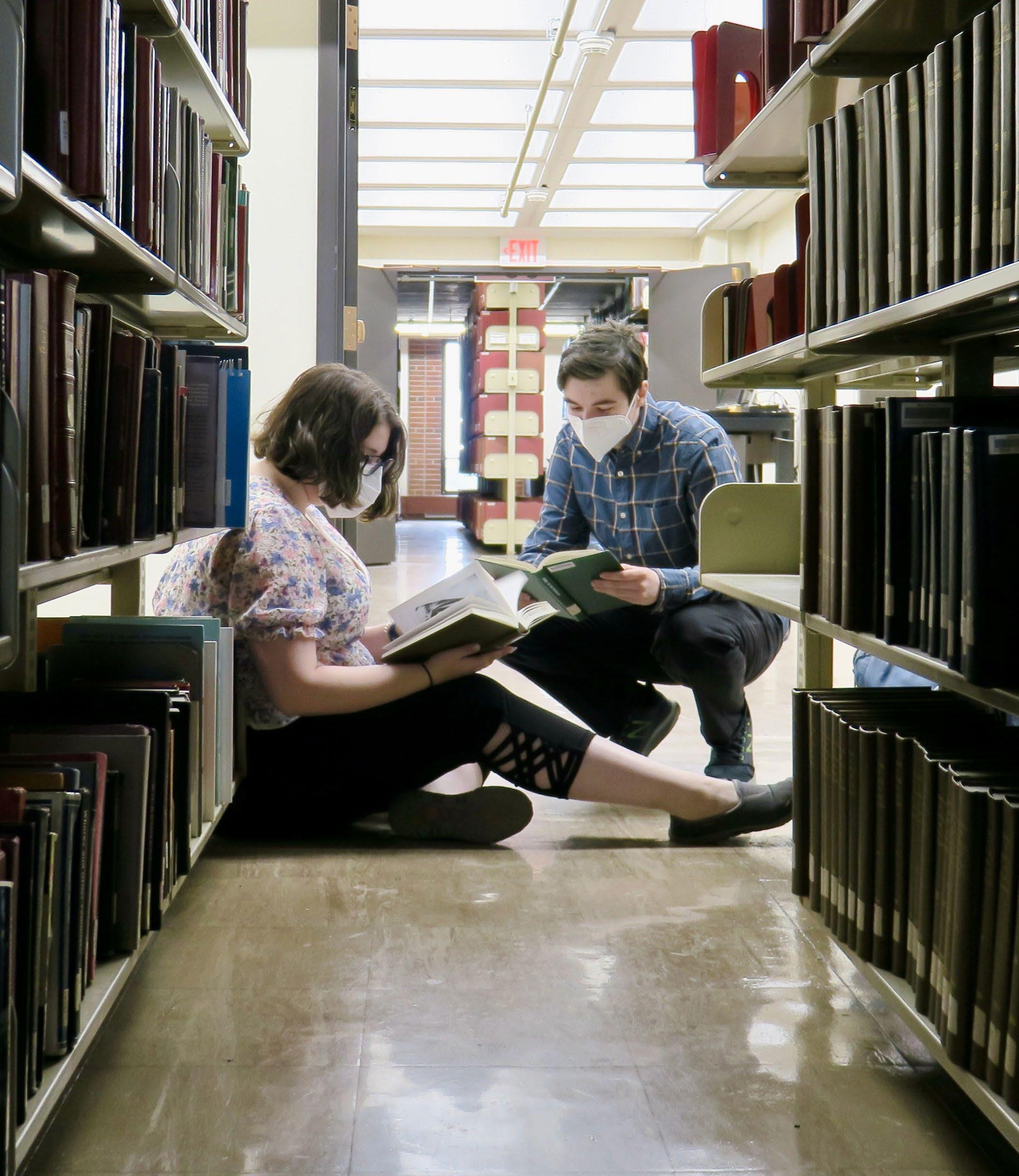 Fellow history majors and good friends Caitlyn Foster ’22 and Robert Cahill spend time in the stacks of the W.E.B. Du Bois Library during a study break before finals.
Fellow history majors and good friends Caitlyn Foster ’22 and Robert Cahill spend time in the stacks of the W.E.B. Du Bois Library during a study break before finals.


 Fellow history majors and good friends Caitlyn Foster ’22 and Robert Cahill spend time in the stacks of the W.E.B. Du Bois Library during a study break before finals.
Fellow history majors and good friends Caitlyn Foster ’22 and Robert Cahill spend time in the stacks of the W.E.B. Du Bois Library during a study break before finals.

The past year saw our return, at least much of the time, to the UMass Amherst campus. Equipped with masks and COVID test kits, faculty and students returned to classrooms, the library, and their offices in Herter Hall. Thanks to the university’s Modern Workplace Initiative, staff were able to keep some of the advantages of remote working by developing hybrid work schedules, which offer flexible time to work on projects while easing demand on parking and reducing UMass Amherst’s carbon footprint.
An unexpected consequence of our pandemic experience was the comfort that the department and the university developed with virtual events. In September, alumnus Kenneth R. Feinberg ’67 and his business partner Camille Biros participated in an interview about their experiences being portrayed by actors Michael Keaton and Amy Ryan in Worth, a 2020 film adapted from Ken’s 2006 book What is Life Worth? In November, independent scholar Lora Burnett joined us from California to discuss her research on the history of the idea of Western civilization. Shortly after the Russian invasion of Ukraine, Professor Audrey Altstadt participated in a UMass event discussing the origins and impact of the war. In April, along with the Wolfsonian Public Humanities Lab at Florida International University, the department convened a panel of historians and educators for a discussion about attempts, by state legislatures and others, to limit the teaching of accurate history in public K 12 schools and some universities. These events reached audiences of hundreds who would not have been able to attend in person.
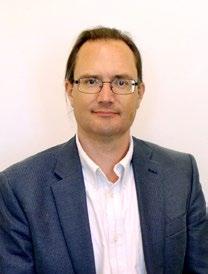
We also returned, slowly, to in-person events. Biographer and journalist Brooke Hauser joined us in the spring as our Writer-in-Residence, including a lecture to an in-person and online audience, while Professor Regina Kunzel of Yale University delivered the Distinguished Annual Lecture for our graduate program. The Five College History Seminar resumed its in-person meetings. Faculty and graduate students gathered, outdoors when weather permitted, for socially distanced meals and discussion of works in progress.
The department was particularly pleased by the recognition that our staff and faculty received. Jess Johnson, Director of Outreach, was honored in the spring with the Chancellor’s Citation Award. This award recognized her myriad contributions to the department, the College of Humanities and Fine Arts, and the university—including our History Institute for K–12 teachers, community engagement activities, the Feinberg Series, and the spring 2021 Ellsberg conference. Jennifer Fronc received the Distinguished Teaching Award, the university’s highest teaching honor, which is initiated by undergraduate students. Richard T. Chu was selected for the Community Engaged Teaching Award; he was also appointed to the Commonwealth of Massachusetts Asian American and Pacific Island Commission. Diana Sierra Becerra and her colleagues were awarded the Outstanding Public History Project Award from the National Council on Public History. Congratulations, Jess, Jennifer, Richard, and Diana!
The year saw a number of transitions. Most tragic was the unexpected death of our beloved colleague Professor Kathryn Schwartz in May of this year, while she was on research leave in France. Emeritus faculty members Mario S. De Pillis Sr., Winfred Bernhard, and Milton Cantor also passed away over the course of the 2021–22 year. The late Robert S. Cox, archivist and affiliated faculty member in history, who died in May 2021, was honored by the renaming of the university’s special collections and archives as the Robert S. Cox Special Collections and University Archives Research Center. On a cheerier note, Suzanne Bell returned from retirement to serve temporarily as undergraduate program coordinator; she was succeeded by Meredith Pustell, who joined us in November to fill the position permanently.
I thank the department’s hard-working staff for their contributions to keeping the department running smoothly and cheerily: Department Administrator Amy Fleig, Graduate Program Coordinator Mary Lashway, Undergraduate Program Coordinator Meredith Pustell, Financial Manager Stefanie Austin, Director of Outreach Jess Johnson, Communications Coordinators Nick DeLuca and Tirzah Frank ’22MA, Internships and Career Advisor Heather Brinn, and Public History Assistant Allison Smith ’22MA. I’d also like to thank the department officers: Associate Chair Priyanka Srivastava, Undergraduate Program Director Heidi Scott, and Graduate Program Director Joel Wolfe.
In closing, I would like to acknowledge the toll that the continuing pandemic had last year on our colleagues, students, alumni, and friends. Despite effective vaccines and precautions, many of us have been touched, directly or indirectly, by COVID-19. Social distancing and isolation remain with us, especially for those who are immunocompromised or otherwise vulnerable, and their consequences continue to touch us all. Regardless of how the events of the last three years have affected you, I wish you all the best in the new year!

Throughout my tenure as director of the history department’s undergraduate program (2018–22), I deeply appreciated the work of the undergraduate program coordinators, without whom the successful daily administration of this program would be impossible. In the fall semester of 2021, Meredith Pustell joined the history department in that capacity, stepping in just as student enrollment for spring courses was getting underway, and meeting the challenges of this multifaceted role with unfailing professionalism, energy, and good humor. I am very grateful for Pustell’s vital contributions to the running of the program and am fortunate to have had the opportunity to work closely with her.
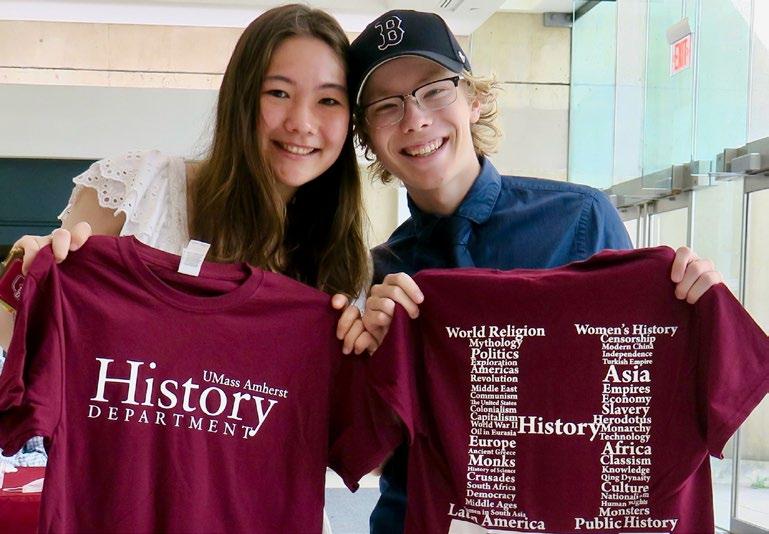
As program director, I worked closely with other colleagues in administrative roles, relying daily on their expertise and institutional knowledge. They made the job a pleasure to do, and I would like to convey my gratitude to them. I sincerely thank Department Administrator Amy Fleig, Outreach Director Jess Johnson, Graduate Program Coordinator Mary Lashway, and Financial Manager Stefanie Austin, as well as Suzanne Bell, who stepped in to work as undergraduate program coordinator on a short-term basis in fall 2021, a position that she held for many years prior to her retirement. I am also grateful to the work-study students who support the running of the undergraduate program. I thank Sam Cadwell, Christine Garcia, Michael O’Connor, Julian Palmer, and Renee Tsang, who worked in this role in 2021–22.
My thanks are due to the faculty members of the undergraduate studies committee for their service during the past academic year. The members of 2021–22 committee were Brian Bunk, Sarah Cornell, Alice Nash, and Mark Roblee. One of the busiest but most rewarding periods in the semester comes in
the spring, when the undergraduate studies committee selects award winners. I warmly congratulate every recipient of this past year’s undergraduate prizes and scholarships (see page 5 for more details) and thank the generous donors who make these awards possible. It was a pleasure to be able to convene in person, for the first time since 2019, to celebrate the achievements of award recipients and graduating seniors at the undergraduate awards ceremony and senior celebration in April 2022. Whereas some undergraduate awards recognize our students’ academic and other achievements in the past semesters, others support summer study, internships, and research. Among them is the Greenbaum History Honors Scholarship, which in 2022 supported Claire Gagnon’s honors thesis research in the United Kingdom. Gagnon’s project examines the experiences of schoolaged British children during World War II, and post-war pedagog ical changes that resulted from England’s Education Act of 1944. During the summer, Gagnon consulted materials in London’s National Archives and conducted research in the Imperial War Museum.
Gagnon is one of twelve undergraduates in the history department who were working on honors theses during the spring semester. Each student made a short presentation on their research topic at a departmental symposium in April 2022. Topics ranged from “Ptolemaic Influences on Egyptian Religion” to “Latecomers and Chinese Semiconductor Development Through the Ages.” As noted by Department Chair and Professor Brian Ogilvie, who opened the event, a growing number of students who are not Commonwealth Honors College (CHC) members are embarking on senior theses. Honors Program Director and Professor
FROM FAR LEFT A student in Professor Jennifer Heuer’s Craft of History course looks at an Olympic medal during a class visit to Special Collections and University Archives.
Leoni Foster ’22 (left) and guest pick out history department T-shirts at the 2022 commencement brunch. Undergraduates attend the spring 2022 People’s Science Fair, which was co-sponsored by the history department and included tables on the history of science. Pictured here, one student thumbs through Professor Sigrid Schmalzer’s children’s book while another looks at entomologist Brian Schultz’s display of insects, including the moths featured in the book.
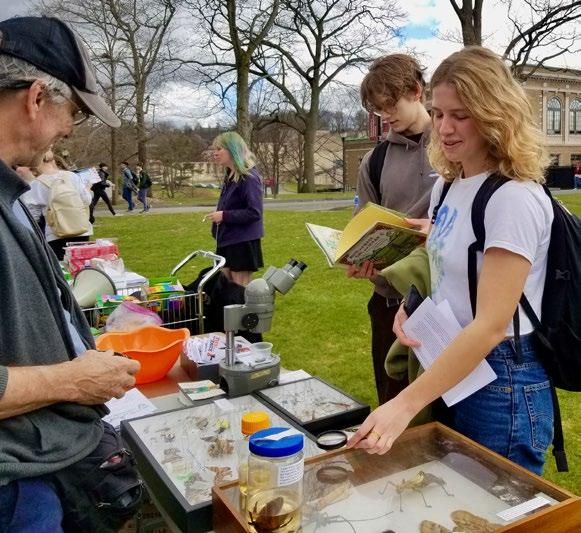
During the 2021–22 academic year, 11 graduating history majors wrote theses or completed honors portfolio projects, working with faculty in the history department, the Commonwealth Honors College, and other departments across campus.
Seamus A. Cusack ’22 , “Nursing for Freedom: Free and Enslaved Black Nurses During & After the American Civil War, 1861–1900”
Wenjin Fang ’22 , “Tocqueville on/in China”
Annika Grace Flynn ’22 , “The Victoria Infirmary: The Role of the Working Class in the Professionalization of Scientific Medicine on the Southside of Glasgow”
Daniel Gordon, who supervised four such students in 2021–22, commented: “At many universities, being an ‘honors’ student simply means that one has done a senior thesis, so it made sense to make the thesis experience available to all students…. The thesis shows a commitment to doing the most advanced work that an undergraduate can do. There is nothing else like it in the curriculum. All the thesis students—CHC and non-CHC— deserve praise for their work, and the symposium was a way to show appreciation.”
Writing is central to the history major, whether this entails working on an honors thesis, a term paper, a research paper for the required junior year writing seminar, or a short creative piece. Since 2017, thanks to the initiative of Professor Garrett Washington, history undergraduates can showcase their writing and gain experience in research and publishing through the UMass Amherst Undergraduate History Journal. With Washington on sabbatical in 2021-22, Daniel Gordon served as faculty advisor to the journal’s student editors. “The student editors did every thing.... They announced the call for papers, took in submissions, screened them, edited them, and formatted the final journal. All I did was outline to the student editors the normal stages of a pub lishing process,” said Gordon. The 2021–22 editor in chief was Anthony Colace. The other editors were Ellie Costello, Alison Chicca Audette, and James Griffin. The 2022 issue, which contains articles by six students, may be accessed electronically at https://bit.ly/UMassHistoryJournal.
Even as our majors focus on their studies, they are encouraged to give thought to future directions. Heather Brinn, a doctoral candidate in history and current coordinator of the department’s
Caitlyn Sarah Foster ’22 , “Ptolemaic Influences on Egyptian Religion”
Maia Anne Frances Fudala ’22 , “AntiFrench Resistance and Human Trafficking in Northern Viêt Nam, 1865–1900”
Andy Xizhe Guan ’22 , “Latecomers and Chinese Semiconductor Development Through the Ages”
William Harrison Huntington ’22 , “U.S. Federal Inaction and Disproportionate Risk among LGBTQ Populations Experienced During Periods of Housing Insecurity and Homelessness”
Kara Lucero Jackivicz ’22 , “Universities and Their Complacency Towards Rape Culture on Campuses”
Elizabeth Louise Lownds ’22 , “Pulling the Strings: The Role of Buddhism in the Cambodian Government”
Shannon Brooke Ohannessian ’22 , “Queer Activism in a Post World War II World: Politics of Respectability and Division in the Queer Community”
Elizabeth Jane Tenerowicz ’22 , “The Crisis with Advertising: How W. E. B. DuBois and Roy Wilkins Shaped Equal Rights Advertising”
Internship and Career Development Office, has been working hard to help students prepare for graduation, whether this means seeking employment or internships, applying to graduate school, or exploring other opportunities. Résumé and cover letter consultations, interview preparation, advice on graduate school applications, and networking are just a few of the areas with which her office assists history undergraduates. In addition to being available for individual consultations, Brinn teaches a course entitled Career Skills for History Majors. In 2021-22, she also coordinated a wide variety of career workshops, which were received enthusiastically by students (for more details see the article below). I thank Brinn for her valuable contributions to this vital aspect of the undergraduate program. In addition, I am grateful to Mark Roblee, who introduced Senior Bridges, a practicum that is designed to support history seniors as they prepare for the next chapter in their lives.
The year brought a flurry of further additions to the undergrad uate course curriculum in history. The department’s course offerings change from year to year, reflecting student needs,
the appointment of permanent and visiting faculty who bring new areas of expertise, and the evolving interests and research projects of instructors. Professor Diana Sierra Becerra, who joined the department in fall 2021, offered new undergraduate courses in histories of women and revolution, public history, and Latin American history. To mention additional examples, students were also able to choose from new courses offered by Professors Hadi Jorati and Sigrid Schmalzer and by doctoral candidate Brian Whetstone on the histories of the rise of Islam in antiquity, science activism, and the city in the modern United States.
Although the return to in-person learning in 2021–22 brought challenges for students and faculty alike after almost three semesters of remote education, it was a great pleasure to see the campus and the halls of the history department come back to life. Our students’ determination, enthusiasm, and ongoing achievements in the face of challenging circumstances are admirable. Heidi V. Scott
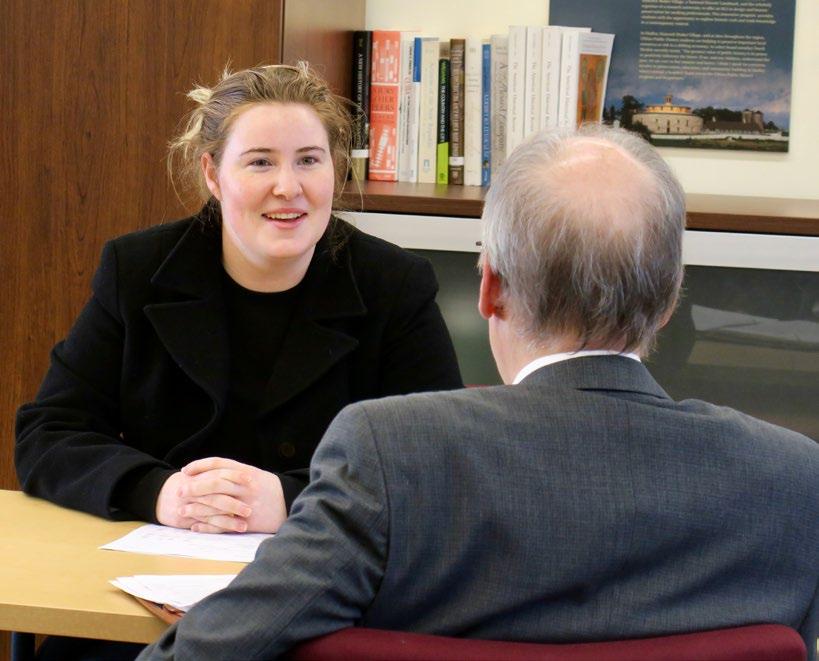
The Internship and Career Development Office host ed the history department’s first undergraduate interview clinic in April 2022. This multi-week clinic was designed to prepare students for real-world opportunities: they began by attending résumé review sessions and an interviewing skills seminar, and then completed mock interviews with UMass Amherst alumni. Those who attended the interview skills seminar learned the different goals and varied preparation required for interviewing for internships, graduate school, fellowships, student jobs, and post-graduation positions. Participants shared real-world opportunities they were applying for along with their résumé. They were then matched with alumni volunteers from the HFA Dean’s Ad visory Council. The alumni served as interviewers and gave feedback to students in remote and in-person sessions. Finally, the Internship and Career Development Office hosted a professional headshot session for graduate and undergraduate students. We look forward to hosting this event again in 2023. Heather Brinn
The Internship and Career Development Office thanks Mark Roblee PhD’19, Bill Noland, Madeleine Noland, Sarah Oh, Robert LaRussa ’76 , Gisela Carbonell, Zach Schlappi, and the HFA Dean’s Advisory Council for their participation in the interview clinic.
The Department of History’s generous donors make these awards possible. Congratulations to all the awardees!
Department of History Summer Internship Award
Joshua dos Reis
Farrelly History Fund Matthew Velzis
Frederic Gilbert Bauer Award / Oxford Summer Scholarship Charlotte Healy Josy Hunter Sabrina Ishanyan Hayley Logan Ryan Richards Greenbaum History Honors Scholarship

Claire Gagnon
Harold W. Cary Prize
Marina Amicizia Anthony Colace William Huntington Jake Leone Aidan Levangie History Opportunity Award Caitlyn Foster Hannah Whalen
James and Cynthia Redman Scholarship
Andrew Bielecki Jenna Boyer
Louis S. Greenbaum History Writing Prize
Long Essay Bret Hackenson Short Essay Mae Whaley Jake Leone, Honorable Mention New Phi Alpha Theta Members
Rose Dearborn Claire Foster
Riley Gregoire William O’Dwyer Andersson Perry
Nicholas Carr Bergstein Scholarship
Jenna Boyer
Paul E. Giguere Scholarship Andrew Bielecki
Richard W. Bauer Scholarship
Shannon Ohannessian Emma Schlegel Hannah Whalen
Robert H. McNeal Scholarship
William Huntington
Simon & Satenig Ermonian Memorial Scholarship
Marina Amicizia Anthony Colace Seamus Cusack Ruslan Gutierrez Michael Holmes William Huntington Alex Kurlan Jake Leone Aidan Levangie Katelyn Maskell Shannon Ohannessian Sevil Usmanova Leo Weinburg
For more information about these awards, please visit umass.edu/history/ department-scholarships
among the ducklings.
Several of the department’s award-winning undergraduate history majors are planning careers as K–12 teachers, a common track for our majors. Three of them—Jenna Boyer, Andrew Bielecki, and Shannon Ohannessian ’22—sat down with the newsletter editors to discuss their goals, inspirations, and experiences at UMass Amherst.


ALL THREE EMPHASIZED HOW THEIR DREAMS of becoming K-12 teachers impact how they’ve approached their history edu cation at UMass. Boyer shared that when in class, “I always think about how my professors teach different concepts or how they organize their classes,” aiming to both learn the stuff of history and pick up different teaching strategies and methods to bring into her future classroom. Boyer noted the importance of edu cation classes as well, highlighting how history majors pursuing careers in teaching benefit from advising and support from the education department.
Like Boyer, Bielecki and Ohannessian shouted out several UMass faculty members who have inspired their plans to teach. Bielecki also reflected on the importance
of representation and on the transformative impact of having down-to-earth, compassionate teachers he could identify with, especially a queer high school teacher: “Seeing someone else like me in a position of both respect and wisdom was crucial to shaping how I saw myself, my capabilities, and my options.”
Boyer, Bielecki, and Ohannessian each expressed goals that reflect those shared by the department at large, from the importance of interdisciplinarity to the value of service learning (such as tutoring) to the larger purpose of teaching history.
They were especially vocal about the need for inclusive classrooms and histories, with Boyer noting: “One of my goals as a history teacher is to teach history accurately and honestly, especially the darker parts of U.S. history that many people would rather keep hidden. I also hope to make my classroom into an accepting and comfortable place for every student.”
Bielecki similarly shared the belief “that students deserve an educator who can actually explain to them why things happened the way that they did … and why certain histories are left out of the official story.”
Ohannessian echoed these themes: “I hope to create an inclusive classroom where all students feel represented and shine a light on history that is often swept under the rug.”
For more on how the department seeks to support K–12 educators and prevent difficult histories from being hidden, check out the report on our “Telling the Truth about History” event on page 29.
Boyer is a recipient of the James and Cynthia Redman Scholarship and the Nicholas Carr Bergstein Scholarship, both of which provide support to aspiring educators. Bielecki is another recipient of the James and Cynthia Redman Scholarship as well as the Paul E. Giguere Scholarship, which similarly aims to support future teachers. Ohannessian is a recipient of the Simon & Satenig Ermonian Memorial Scholarship and the Richard W. Bauer Scholarship, which honor exceptional academic achievement. The history department extends its gratitude to College of Education faculty member Robert Maloy for his collaboration and support of history majors pursuing careers as K-12 teachers.
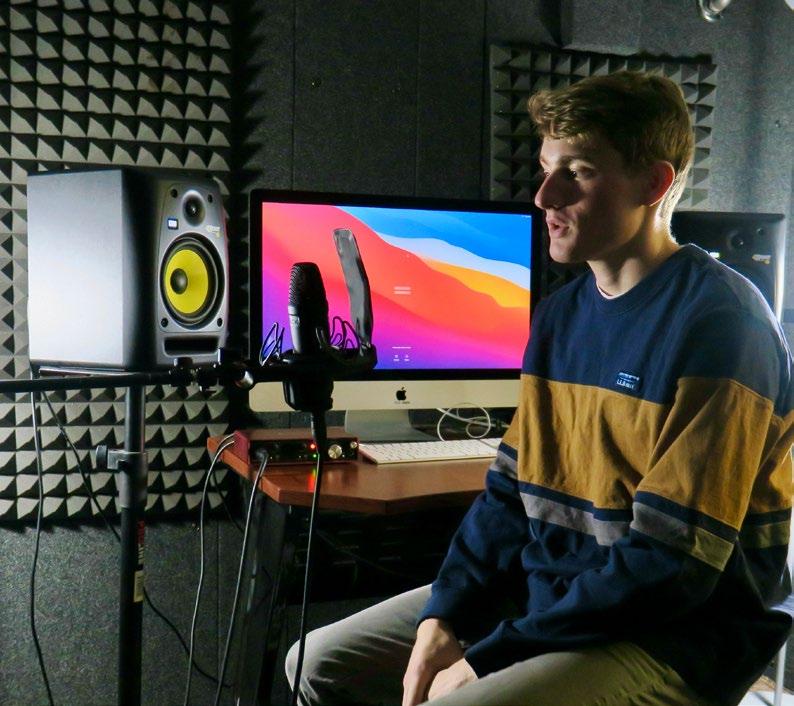
In May 2021, history and English double major Elliot Hajjaj visited the library’s Digital Media Lab in preparation for his summer internship at Tumble Media, an educational chil dren’s podcast company. During the internship, he honed his research and writing skills, developed new skills in software and podcasting, and learned from Tumble’s novel educational practices. At the end of the internship, Tumble offered him a paid staff position, and Hajjaj is currently working as an assistant producer for the company.
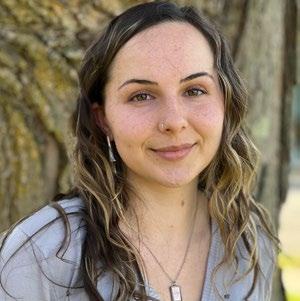
HISTORY MAJOR WENJIN FANG ’22 graduated in May and is now pursuing a master’s degree in East Asian studies at Duke University. Working under the supervision of Professor Daniel Gordon, Fang chose to write a thesis because she “wanted to learn the skills of being a scholar and pursue a topic I have a deep interest in.” Her thesis, “Tocqueville on/in China,” identifies and analyzes every reference Alexis de Tocqueville made to China in his various writings—an aspect of Tocque ville’s work that few have studied. Fang argues that his discussion of China sheds light on his understanding of democracy, writing that for Tocqueville, “a democratic state does not have

to be a republic. He uses the word ‘democracy’ to describe a social condition in which ‘equality of conditions’ prevails.” Fang also analyzed how Chinese politicians and scholars have made use of Tocqueville to support the state centralization Tocqueville criticized, noting that this practice “is in line with the traditional ‘ti-yong’ approach Chinese have historically taken in receiving ‘Western imports’: using Western knowledge as a tool to maintain the existing political system.”
MAE WHALEY, A JUNIOR in the Social Thought and Political Economy Program, wrote her Greenbaum Prize-winning historio graphical essay “Nuancing Modern Chinese History in the Reign of Global Narratives” for Professor Sigrid Schmalzer’s course History of Modern China, a blended graduate and undergraduate seminar. Like Fang’s, Whaley’s paper examines the treatment of Chinese history in the writings of Western intellectuals, and Chi nese intellectuals’ engagement with Western paradigms. In her paper, Whaley argues that “the global infiltration of capitalism in the twentieth century brought with it normative conceptualiza tions of global history which challenged non-Western scholars to reconstruct their own histories in Western terms, or to imagine new methods of studying and producing history.” Whaley explores the ways different scholars tackled the challenge of how and whether to relate Chinese history to Western narratives, skillfully placing many writers in conversation with each other. Regarding her process, Whaley said that “writing a paper about how Chinese history has been conceptualized within a white supremacist and capitalist global setting, especially by scholars resisting those forces, was challenging but truly fulfilling.”
The Louis S. Greenbaum History Writing Prize was established in honor of Professor of History Louis S. Greenbaum, who inspired, challenged, and guided hundreds of aspiring students of history and faculty alike. The prize recognizes outstanding undergraduate papers written for history courses.
The 2021–22 academic year was defined by our return to in-per son instruction. This is not the place to analyze the pandemic and its effects on higher education, but it was clear to me in early September 2021 that students and faculty both loved being back in person, even if we were all still masked and trying to maintain some social distancing.
The incoming class of graduate students included four PhD students and nine MA students, four of whom were also pursuing the public history certificate. Their fields range from colonial Lat in America to modern China to the United States. In the fall, the graduate program co-presented an event with Professor Diana Sierra Becerra. At the urging of the students, I also arranged for two separate “works in progress” evenings during which graduate students Edward Ofilada, Shay Olmstead, Brian Whetstone, and Alison Russell presented original scholarship. Some presentations were dissertation chapters, while newer graduate students workshopped seminar papers for future publication. Their research explores topics ranging from how trans people used employment discrimination lawsuits as a form of activism in the 1970s–1990s to the role of Black women in the late twentieth century historic preservation movement.
Seven of our students defended their dissertation prospectuses during the last academic year: Anotida Chikumbu, “Unsung Heroes: African Veterans of World War Two and the Decoloni zation of Zimbabwe, c. 1945–1979”; Sean Hough, “Together for Peace: The Volksbund, Evangelical Church, and German Memory”; Deborah Kallman, “Marnie: The Life of Hazel Ham mond Albertson and Chestnut Hill Farm, 1909–1969”; Tanya Pearson, “‘Pretend We’re Dead’: The Rise and Fall of Women in Rock in the ’90s”; Anthony Repucci, “The Persistence of Union: East Tennessee in the Civil War and Reconstruction”; Casey Scarpati, “Cold War Imprints: American Books and United States Information Service Libraries in South Vietnam, Past and Present”; and Bing Xia, “Class Enemies on the Shop Floors: Power Dynamics between the Party and Workers in a Socialist Factory” (for more on Xia’s research, see page 12).
Graduate students were active participants in our signature public programs—the March Writer-in-Residence program with Brooke Hauser and the April Distinguished Annual Lecture presented by Regina Kunzel from Yale (for more on these events, see pages 9 and 13).
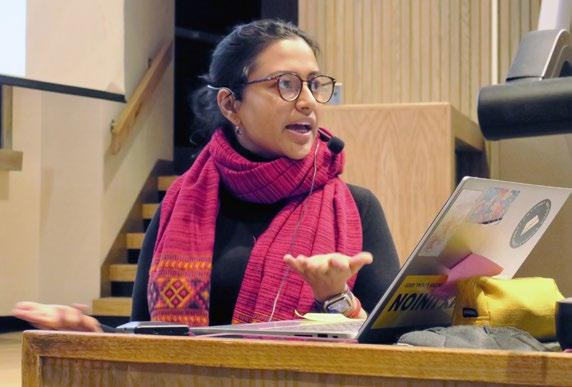
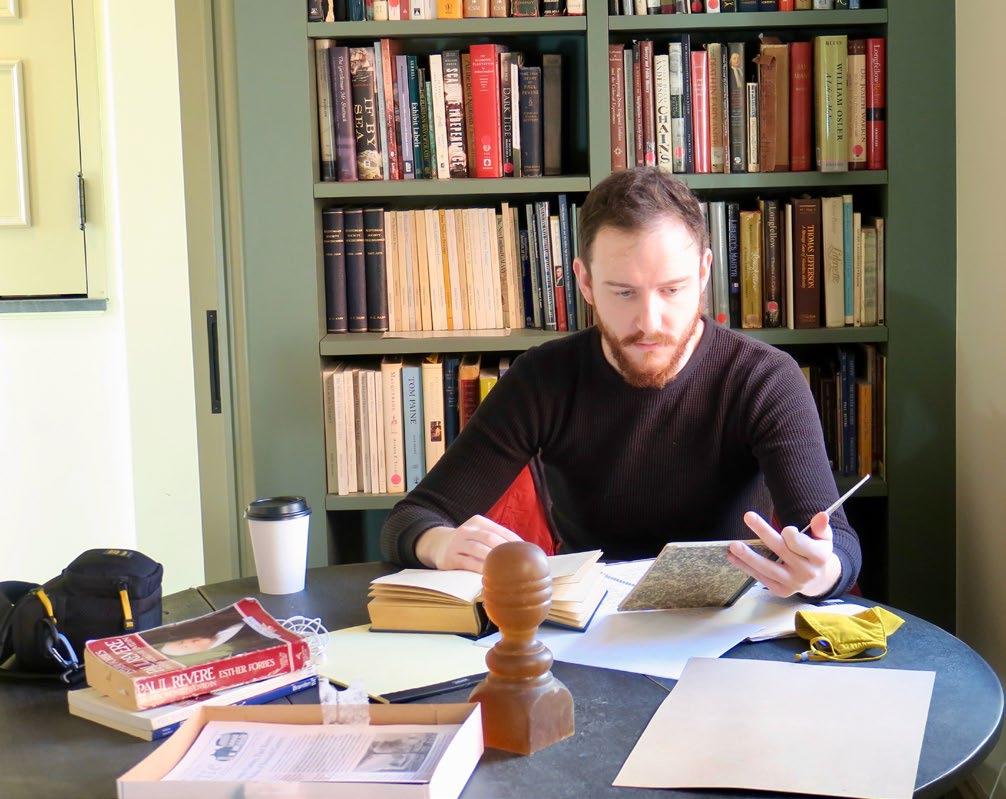
In May, we were able to gather in person in the Campus Center for the graduate awards ceremony, which had been held remotely in 2021. The event included most of the students, many faculty, and quite a few of the emeriti. As in the past, our graduate students won a number of prestigious departmental, university, and external awards, as you can see on page 13. Three PhD candidates, Adeline Broussan, Jenna Febrizio, and Sarah Lavallee, defended their dissertations this academic year and graduated in May, along with Jason Higgins, who finished his dissertation last summer. Brittany Frederick and Charles Weisenberger finished their dissertations this past summer and will officially graduate in May of 2023. Eight of our students completed their master’s degrees: Gina Beavers, Zoë Cheek, Marguerite DiGiorgio, Tirzah Frank, Emma Lewis, Eric Ross, Allison Smith, and Cat White.
For this fall, the Graduate Studies Committee (Professors Christian Appy, Jennifer Heuer, Solsiree del Moral from Amherst College, Sam Redman, and I), in consultation with the history department faculty, admitted seven new PhD students, three MA students, and three public history MA students. Two of the new PhD students are focusing on China, which continues to be a growing strength in the department. The program’s focus remained primarily on U.S. history and public history, but we have continued to attract students who work on nearly every area in the field, and we have been particularly fortunate to be able to bring outstanding young scholars from abroad into the graduate program.
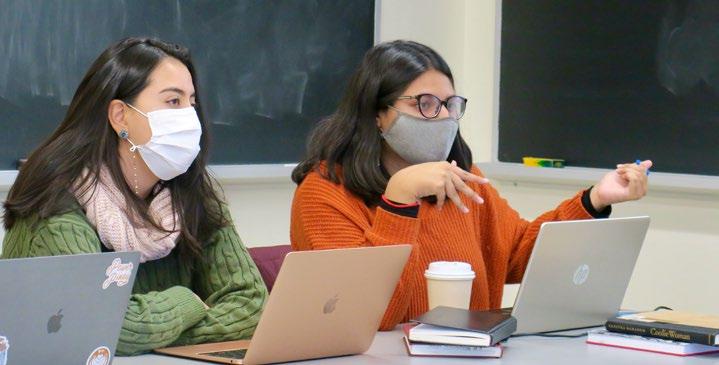
As is always the case, graduate education would not be able to thrive here without the extraordinary work done by all of our staff, but especially by Graduate Program Coordinator Mary Lashway. Mary has done a remarkable job of holding our program together during the pandemic, and during the transition back to in-person learning. Joel Wolfe
BROOKE HAUSER VISITED the depart ment during the week of March 28 as our 2022 Writer-in-Residence. Hauser is the former editor in chief of the Daily Hampshire Gazette and is at present an assistant editor at the Boston Globe She is also the author of Enter Helen: The Invention of Helen Gurley Brown and the Rise of the Modern Single Woman (2016) and The New Kids: Big Dreams and Brave Journeys at a High School for Immigrant Teens (2011). Hauser present ed several writing workshops for our graduate and undergraduate students. She also attended Professor Jon Olsen’s Dissertation and Research Design and Professor Jennifer Fronc’s American Thought and Culture II seminars, as well as a reception and a three-minute-thesis event. She completed her very successful week on campus with a public lecture about writing for a broad audience, how her work as a journalist shaped Enter Helen, and how that research opens up critical questions about women and work. During the ensuing Q&A, audience members were eager to hear more about her experiences leading our local paper of record, and she led a great discussion on the challenges local newspapers face today. Joel Wolfe
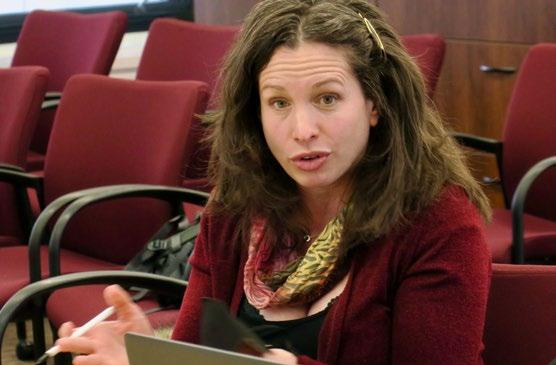
Sean Klimmek ’22MA , “Heavy Metal in Medieval Europe”
Allison Smith ’22MA , “Historic Houses and the Food Movement: Casey Farm and Coastal Growers’ Market”
Adeline Broussan ’22PhD, “Grassroots Diplomacy, Warrior Femininity, and Intersectional Sisterhood during the French and American Wars in Vietnam (1945–1975)”
Jenna Febrizio ’22PhD, “Social Connections & Memory Dimensions: A Layered Portrait of a Twentieth-Century Art Network”

Sarah Lavallee ’22PhD, “Reclaiming the Past: The Legacy of National Socialism in Northern Germany”
Professor Alon Confino explores students’ work at the year-end MA capstone presentations.

“To work in community, especially during a crisis, is to work in a state of heightened vulnerability,” Mariam Williams, project director of Chronicling Resistance, reflected during her keynote address at this year’s Graduate History Association (GHA)-organized UMass Graduate Student History Conference “Subject to Change: Adaptation in Moments of Ongoing Crisis.”
While Williams was speak ing to the conference theme—how historical and present-day crises impact how we think about and practice history—her words also reflected the approach the GHA took this year. In fall 2021, as we emerged from a remote year and tried to rebuild community, most of us, including all five officers, had never met together in person. To establish strong collegiality and ensure our work supported the needs of other graduate students in the department, we had to be open and reflective. In order to provide professional development, we designed teaching workshops to support graduate students who had never taught before or had never taught in person. On the social side, we organized outdoor events like apple picking or going out for ice cream at a local dairy as accessible ways of building community.
Graduate students enjoy a GHA-organized gathering for ice cream at Flayvors in Hadley.
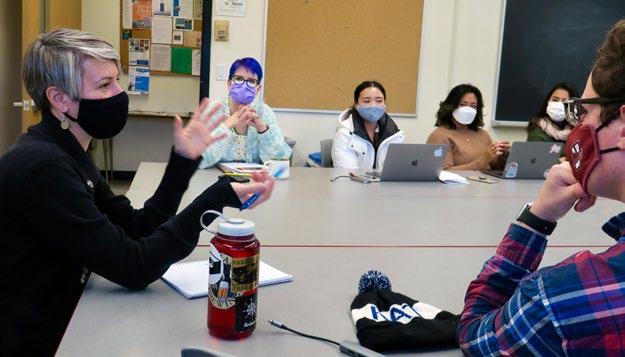
Hosting the conference on Zoom was also an experience in vulnerability. Graduate volunteers worked tirelessly to craft a call that reflected our department’s concerns about doing history in crisis and to curate panels that brought together interdisciplinary scholars. We hoped to facilitate discussions about the histories of marginalized communities and activists. Our panels ranged from public history COVID-19 responses, like making visible the mourning rituals of Zoom funerals and using online escape rooms to engage a virtual audience in museum content, to grappling with the histories of racial injustice in nineteenth-cen tury Liberia or anti-lynching efforts by twentieth-century Black churches. To present ongoing research on Zoom is to take a risk, because it’s hard to know what people are getting from the other side of the screen. Still, we were able to support participants as far away as Colorado and Montreal, as well as across four UMass departments.
Williams made it clear that as histo rians working with the public, we have to be open to others’ needs and clear in our expectations of ourselves and others. This guidance on empathy, vulnerability, and leadership informed our practices throughout this tumultuous year. The community the GHA has built coming out of the pandemic will hopefully strengthen the department in the coming years.
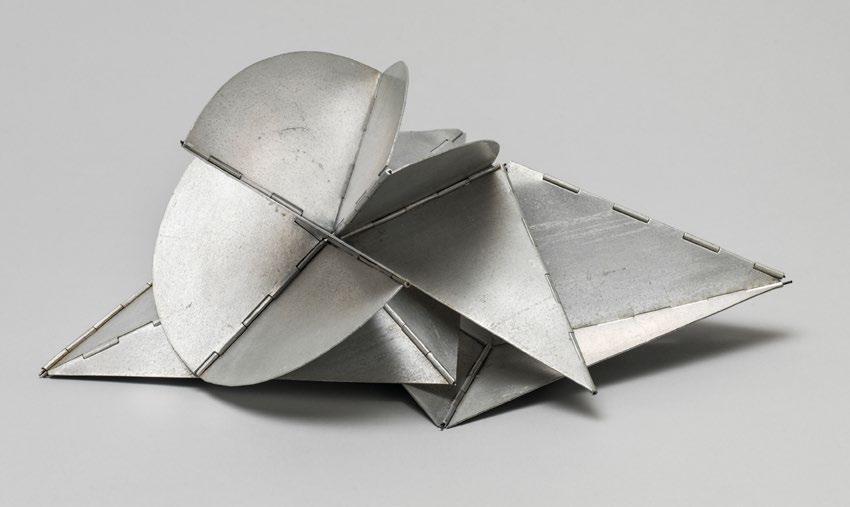 Alison Russell
Alison Russell
In Professor Jason Moralee’s fall 2021 Global History seminar, graduate student Cat White ’22MA wrote a histo riographic essay exploring how the history of mental illness and psychiatry can be read in art—and hence, how art can be an entry point into understanding history in new ways. Among other artworks, White explored the Bichos series by Brazilian artist Lygia Clark, which was inspired by the artist’s personal experiences with psychoanalysis. The piece is meant to be handled by viewers, who manipulate the hinged sides to expose the interiors, wherever they decide that may be. In her paper, White reflected on how the artwork offers historical insight into changing psychiatric methods and how people adopted them.
On February 28, 2022, I scraped up an acquaintance with Mr. Wang, the chair of the management committee of a textile factory, who gave me permission to visit the factory’s archives. The factory closed and was razed to the ground in 2004, leaving the management committee to deal with issues such as pension distribution, administrative docu ment preservation, and employment relationship verification.
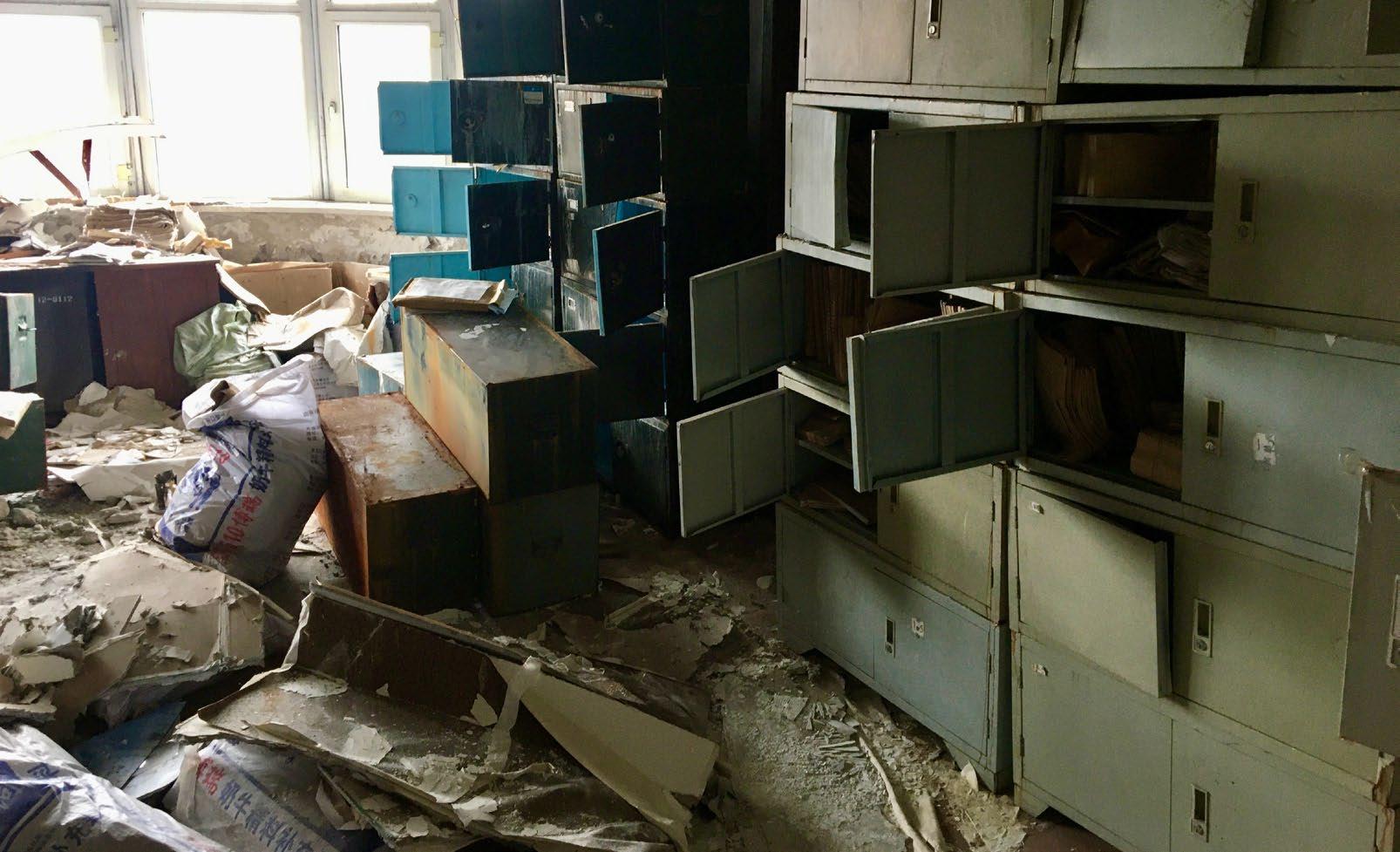
For 18 years, the committee was rootless, floating like dandelion seeds with hundreds of cabinets of archival documents on their backs until they found this shabby building for storage. I spent three months there mining the invaluable history of the factory. But, as Wang told me, he would be happy if some act of God caused the archives to disappear. He harbored suspicions as to why a young man like me would study this damp, mildewy, and worthless “garbage.” In fact, he would be in trouble if govern ment officials found out about our agreement. Wang warned me to watch out for my advisors in the United States, who might use these documents against socialism.
However, Wang and his colleagues’ connections to the party-state were far from clear. As party members, they supported Russia’s “Special Operations” in Ukraine, and they never doubted China’s “COVID-Zero Policy” in the pandemic. Nevertheless, their ideas were sometimes at odds with party leaders. Shanghai citizens, they believed, deserved the lockdown not for the sake of saving lives but due to their discrimination against outsiders. Sometimes, they could break party discipline
without being noticed. On other occasions, they might voice their dissatisfaction with the regime.
Is Wang loyal to the party? Or is he a deviant? Why didn’t he throw that “garbage” away? And why did he show it to me, putting himself at risk? Archival documents show that workers like Wang were not uncommon in Maoist China. They abided by the party’s propaganda, mobilization, and discipline during the day but undermined them at night. Stories of these workers reveal not only the number and variety of delinquency in socialist workplaces, but also fissures and tensions in socialist China, vacillations in party policy, and conflicts between campaign-style justice and the moral economy of rank-and-file employees. As a historian of socialist China, I am intrigued both by ordinary people’s complex and contradictory relations with the party and by the party’s persistent but often frustrated attempts to shape the society and the people.
Many people led their lives like dandelion seeds: drifting in the air, they went with the wind. They fell and perished in silence and buried their memories in the soil of history. On one morning in spring, I stepped into a room, unlocked a cabinet, and opened the documents. Thousands of dandelion seeds flew out from the pages, narrating their stories that pushed me to consider how to find and interpret politics and culture of China’s socialist past from a different angle. Bing Xia
We are grateful to our donors, who make these generous awards—and the important research they support—possible. For more information on these awards, visit umass.edu/history/graduate-awards
Caldwell Writing Prize
Edward Ofilada
Allison Smith
Frederic Gilbert Bauer Research Fellowship
Kimberly Enderle Sean Hough Anthony Repucci
Hands-On Grant Nicholas Anderson Melanie Meadors
History Department Travel Grant Sheher Bano Seth Kershner Guanhua Tan
Joyce A. Berkman Endowed Fund in Women's History and Women's Studies
Emily Whitted
Jumpstart Grant
Marwa Amer Anotida Chikumbu
Marvin Ogilvie Memorial Award for Foreign Language Study
Carina Dreyer Maya González Jaehee Seol
Richard Gassan Memorial Scholarship
Alison Russell Brian Whetstone
Robert & Jeanne Potash Latin American Travel Grant
Yuri Kieling Gama María Belén Portilla Moya
Simon and Satenig Ermonian Graduate Award for Excellence in Graduate Teaching
Nicholas Anderson Carina Dreyer Katlyn Durand Seth Kershner
UNIVERSITY AWARDS
Boscov Fellowship
Kimberly Enderle
Graduate School Fieldwork Grant Guanhua Tan
Graduate School Pre-Dissertation Grant Emily Whitted Seth Kershner
Henry F. May Award, Society for U.S. Intellectual Historians
Alison Russell
Jenny Craig Fellow, Institute for the Study of Democracy Anotida Chikumbu
Archival image from St. Elizabeth’s Hospital.
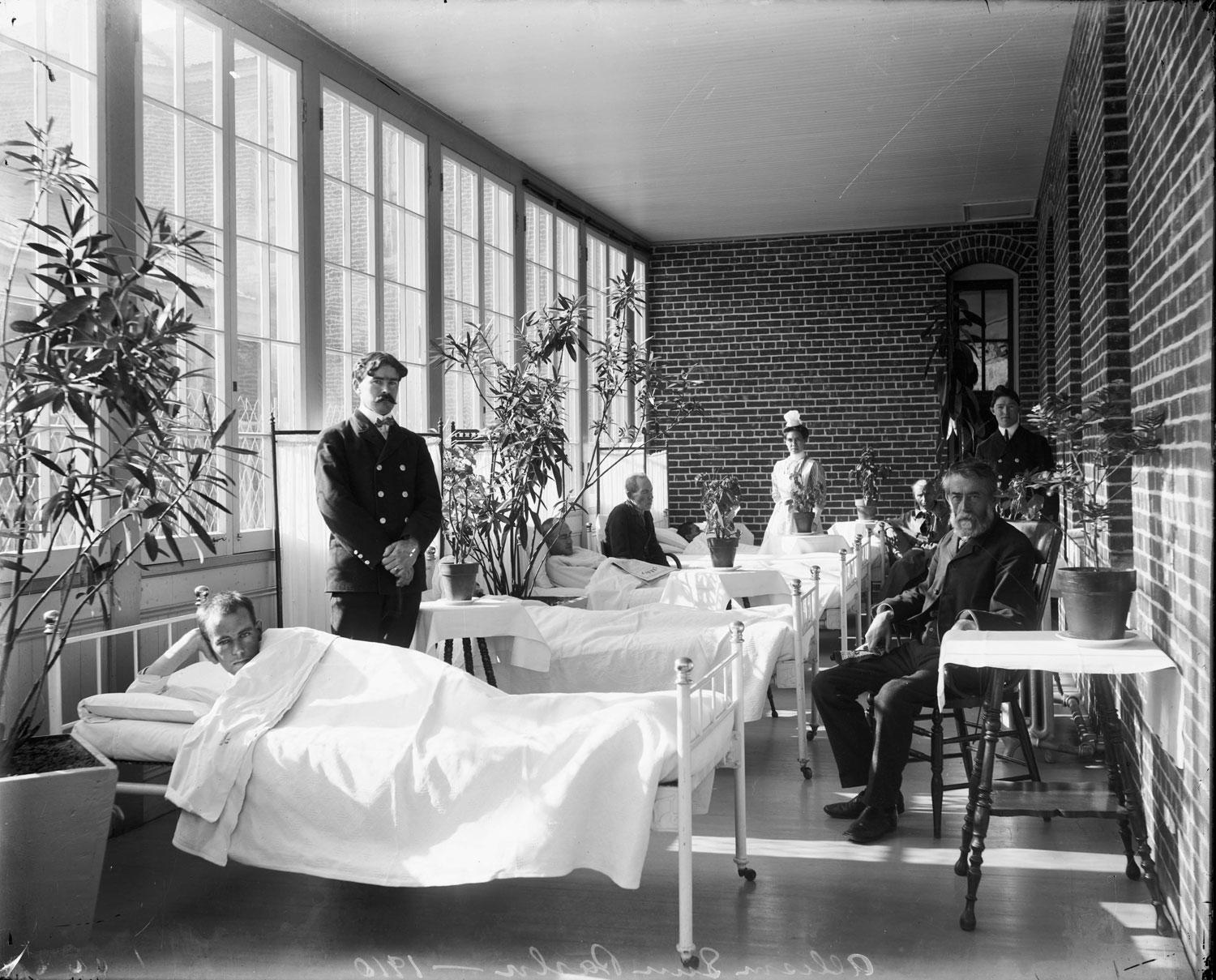

As an Eva Fierst Student Curatorial Exhibition Fellow at the University Museum of Contemporary Art (UMCA), I spent the year flitting between public history and art history. With support from faculty in both departments (especially History of Art and Architecture’s Professor Karen Kurczynski) and from UMCA staff, I co-created an exhibit from the UMCA’s permanent collection. Art history master’s student Cecily Hughes and I reflected on our own experiences of the pandemic and then selected pieces that highlight art’s transportive potential. We built the exhibit around the themes of home, fantasy, escapism, nature, the uncanny, and the ways that history haunts everyday experience. In this photo, our plans are starting to become reality—Cecily and I are crouched alongside Collection Manager and Registrar Jennifer Lind, examining a mock-up of one of the walls while Facilities and Installation Manager Lyle Denit adjusts a work in the back ground. Tirzah Frank ’22MA
This past year, I was honored to take on the role of director of the UMass Amherst Public History Program. Doing so represents both a thrilling and daunting reality for me, as the program’s previous leaders, Professors David Glassberg and Marla Miller, helped to establish UMass public history as one of the most important programs of its kind in the entire nation. I can only hope to keep up the impressive momentum they have established since 1986.
Even beyond the leadership change, this was an active and exciting transition year for the Public History Program, one in which many new projects were launched. We went from gathering remotely online to in-person gatherings, starting with a fall field trip to Old Sturbridge Village. We welcomed a new faculty member, Diana Sierra Becerra, who taught an un dergraduate public history course in the fall. She also won the Outstanding Public History Project Award from the National Council on Public History (NCPH) for her collaborative work on the We Make History project (for more on this, see page 19). And as always, students gained new skills through internships and workshops.
We were served well by in-person meetings, especially when we could couple these gatherings with new possibilities presented by videoconferencing technologies. For example, with support from the Charles K. Hyde Visiting Practitioners Program, we had remarkable guest speakers “visit” from other regions this year, something that was previously impossible. Students heard from Julie Peterson ’16MA from History Colorado, Modupe Labode from the Smithsonian, and Mark Sawchuk from GLBT Historical Society, among others. Following a year confronting the realities of the coronavirus pandemic, race and racism, and economic inequality, our students are becoming especially adept at facilitating difficult conversations about history and the meaningful legacies of the past for the present day.
It was also an exciting year for field service projects: students in my Introduction to Public History class were eager for the op portunity to collaborate with local alumni and to gain hands-on experience. Melanie Meadors and Nicole O’Connell worked with Amanda Goodheart Parks ’18PhD of the New England Air Museum to develop online materials for K–12 educators, including coloring sheets, maps, and short documentary-style films. Marisa Budlong, Maya González, and Devinne Melecki collaborated with Nuri Sherif ’16MA of the UMass Center for Women and Community to develop timelines that will become the foundation of an upcoming exhibit marking the organization’s 50th anniversary. And as detailed on page 20, Kay Mattena and Katlyn Durand continued a project with Meghan Gelardi Holmes ’06MA at the Colonial Society of Massachusetts.
Thanks to the generous support of Dr. Charles K. Hyde ’66 and Judith Barter ’91PhD, students completed internships at several organizations across New England and beyond. Last year, students took advantage of this opportunity to gain hands-on museum experience in places like Historic Northampton, Gunston Hall, and Mercer Museum and Fonthill Castle, while this year’s recipients took a more history communication focus, interning at organizations such as the International Public History journal, Insurrect! Radical Thinking in Early American Studies, and the Washington Post’s Made by History. We are eternally grateful for the support from Charles Hyde and Judith Barter, which gives our students the freedom and flexibility to accept unpaid or underpaid internship opportunities.
Beyond internships, the Public History Program and its students have been active in engaging with community organizations and helping them to dig deeper into history. We co-sponsored conferences like the Dublin Seminar for New England Folklife (which Miller serves as president) and the Massachusetts History
Conference on embracing the new and unexpected in public history practice. We also co-hosted the Industrial Crafts Research Network’s inaugural conference (for which Miller and PhD student Emily Whitted served as co-organizers).
Marla Miller, Jess Johnson, Kate Freedman ’18PhD, Erika Slocumb, Zoë Cheek ’22MA, and Emma Lewis ’22MA, alongside community-based collaborators, worked on the Documenting the Early History of Black Lives in the Connecticut River Valley project that brought together local historical societies on an archival mission to document their town’s Black history. PhD students also worked with Miller on grant-funded projects at the Porter-Phelps-Huntington Museum (for more details on this work, see page 17). Together, these projects show the program’s commitment to supporting local initiatives in sharing scholarship with the public and bringing more inclusive histories to light. This emphasis was also reflected by the work of alumna Laura Miller ’14PhD, who received an honorable mention from the National Council on Public History for excellence in consulting for her
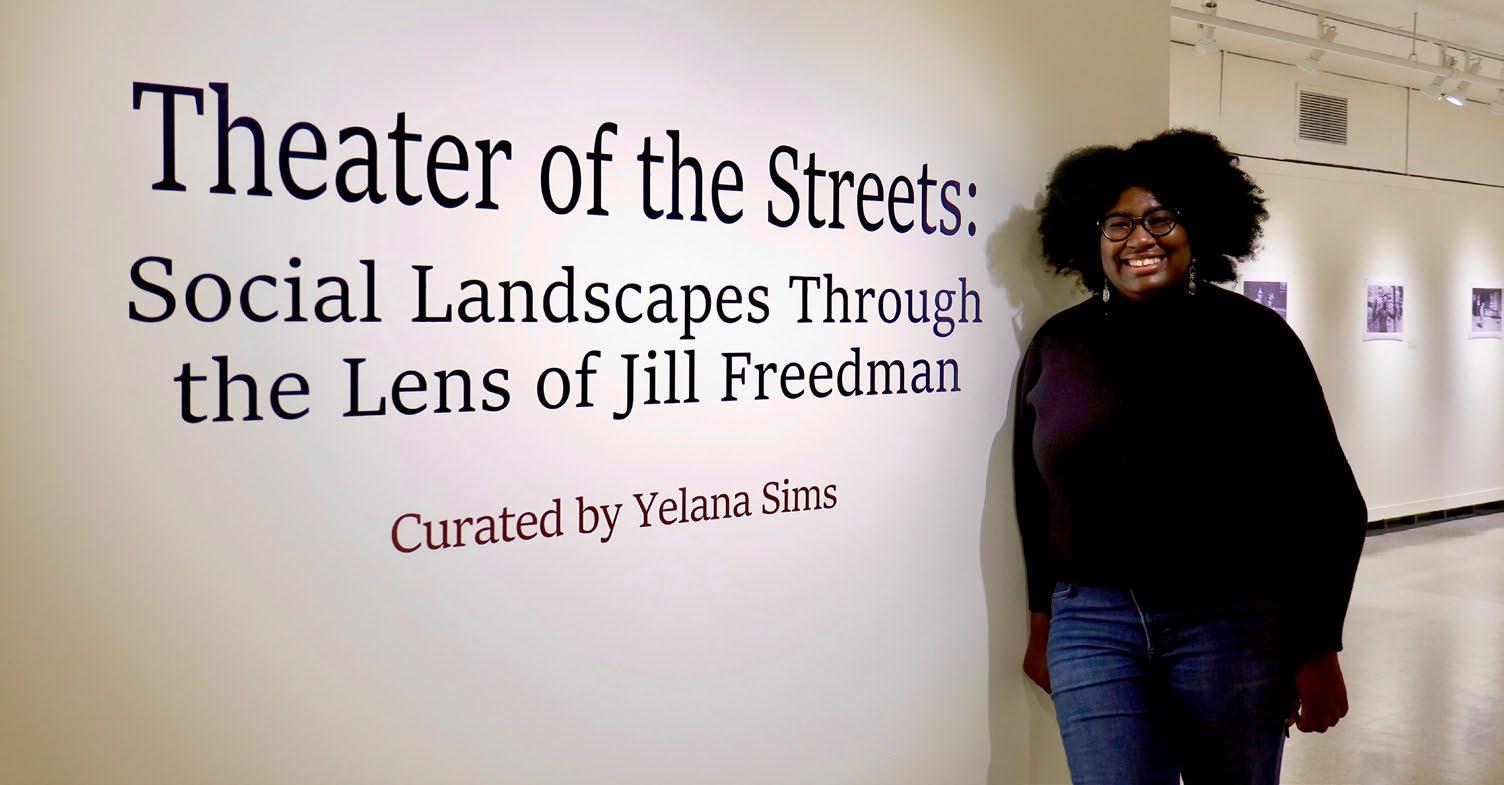
project “An Island Apart”: The Job Corps at Acadia National Park, 1966–1969, which focused on the long ignored and whitewashed history of the integrated Acadia Job Corps Conservation Center.
And as always, students spent their time writing and presenting their work to public audiences. Among others, Maya González and Melanie Meadors published numerous articles and blogs on their respective subjects of Jewish history and women’s history. Maya Cunningham published a book chapter and curated a Spotify playlist to accompany her article in Ms. Magazine. Several students, including Emily Whitted, Brian Whetstone, and Yelana Sims, presented at conferences. Tirzah Frank ’22MA co-curated an ex hibit at the University Museum of Contemporary Art, while history MA student Nicholas Anderson curated an exhibit on military uniforms at Wistariahurst Museum. With the support of a presti gious Fulbright Fellowship, PhD student Ross Caputi embarked on a multimedia oral history project to document and describe the critically endangered dialect of a southern Italian village. Finally, Allison Smith ’22MA defended her master’s thesis on historic houses and the food movement.
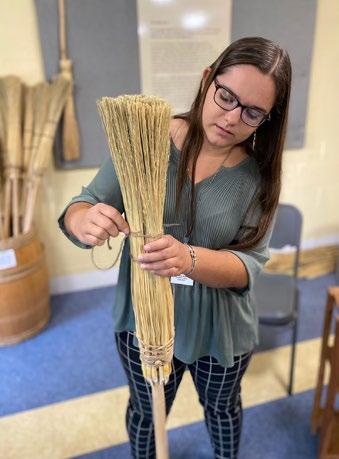
Six students completed their public history certificates alongside master’s degrees this past year: Zoë Cheek, Marguerite DiGiorgio, Tirzah Frank, Emma Lewis, Allison Smith, and Cat White. We welcomed an exciting cohort of new public history students in the fall, and we look forward to the new projects, programs, and other adventures that lie ahead for our community. Sam Redman
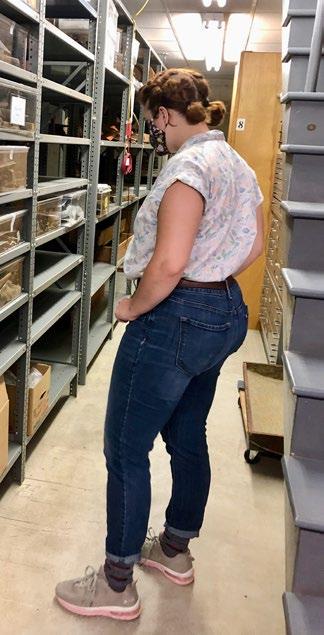
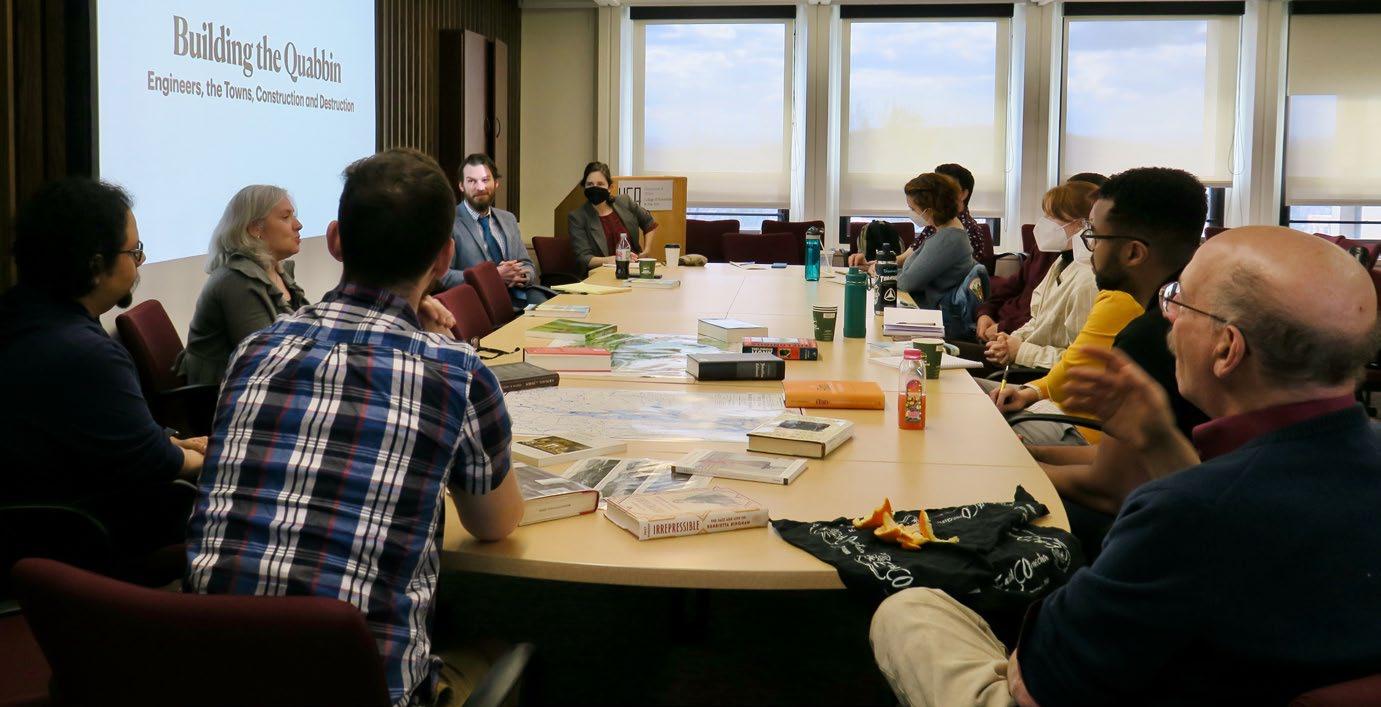
After a winter spent examining and rethinking the collections and thinking deeply about best practices in house museum interpretation, PhD student Emily Whitted and Professor Marla Miller developed a vision for a major reinterpretation of the Porter-PhelpsHuntington Museum.
In April they presented the proposed tour to board members and a wide array of museum stakeholders past and present, including descendants of the original residents, area historians, museum and library specialists, and community mem bers. The well-received tour was implemented in summer 2022, with the help of the museum’s summer intern, UMass undergraduate Joshua dos Reis. Emily’s project was one of four that graduate students in history, public history, and African American studies carried out for the museum, with support from an array of funders. Miller was the principal investigator for each, and so all the work was interconnected, and all designed to help interpretation at the site tell more diverse and inclusive stories.

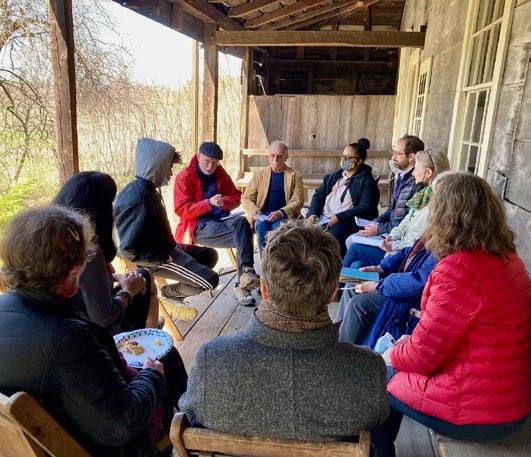
Alongside Whitted’s work to surface untold stories in the collections, Brian Whetstone and Professor Miller coauthored a revision of the museum’s 1973 National Register of Historic Places nomination to include more labor history content, and also to narrate the history of past-keeping at the site; Erika Slocumb researched nine teenth- and twentieth-century African American history in Hadley and the Valley; and Alison Russell researched Charles Phelps’s business ventures in the Caribbean, as well as his general investment in plantation commodities dependent on enslaved labor.
The Porter-Phelps-Huntington Foundation—frequently in collaboration with UMass Amherst students including Andre Cotton ’01MA, Beth Terhune ’98MA, Caitlin Osborne ’97MA, Kari Federer ’87, Anne Poubeau ’00MA, Carrie Fellows ’97, and Gabrielle Burke ’00—has long been striving toward a more inclusive and diverse historic house museum interpretation. That work will become even more robust in the years ahead, especially because in summer and fall 2022 the large and ever-growing archival collection associated with the site moved from Amherst College to the Robert S. Cox Special Collections and University Archives Research Center. Marla Miller
TOP LEFT PhD student Alison Russell presents her research on Charles Porter Phelps’ participation in the slavery-driven transatlantic trade during a June 2022 event that also featured Brian Whetstone and Emily Whitted
TOP RIGHT In spring of 2022, the project team gathered community stakeholders to offer feedback on the first draft of the updated tour.
This year’s activities were funded by the National Park Service/Massachusetts Historical Commission Underrepresented Communities grant, the National Endowment for the Humanities “A More Perfect Union” program, and the Mass Humanities Expand Massachusetts Stories initiative.
Domestic worker history belongs in domestic worker hands. As a four-year collaboration between the National Domestic Workers Alliance (NDWA) and a team of Smith College and UMass Amherst historians, including Professor Diana Sierra Becerra, the We Make History project is putting it there.
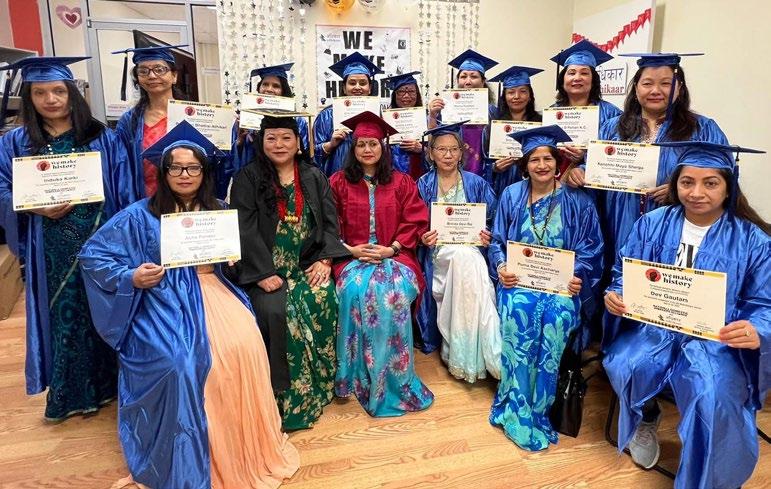
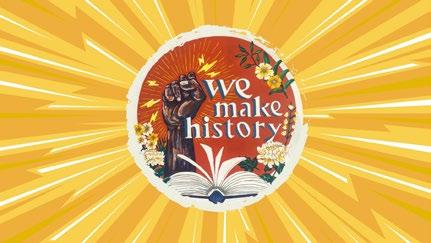
We Make History highlights the rich tradition of domestic workers organizing for a more just economy and democracy, from Indigenous resistance in the eighteenth century to Black Lives Matter activism today. The project features: a digital timeline on the history of domestic worker organizing; four educational videos; biographies and hand-painted portraits of 21 movement ancestors, like Dorothy Bolden, who founded the Na tional Domestic Workers Union of America; a curriculum for domestic workers to learn about domestic worker movements. Available in six languages, the materials empower domestic workers to organize for better working conditions, and they edu cate audiences interested in labor history and women’s history. From September 2020 to May 2021, Sierra Becerra trained a cohort of 16 domestic worker leaders
as labor historians. Today, more than 40 affiliate organizations of NDWA will have taught and graduated from the curriculum.
In spring 2022, We Make History won one of the most significant awards in the field of public history: the Outstanding Public History Project Award from the National Council on Public History. The organization lauded We Make History as a “stellar digital public humanities and social justice project that serves multiple functions and audiences, engages the past to advocate for a better future for do mestic workers, and educates leaders and students alike.” The collaborative nature of this project speaks to the possibilities for social change that public historians and community activists can create.
Hand washing laundry, ca. 1900. Library of Congress, Prints and Photographs Division (LC-USZ62-51058).
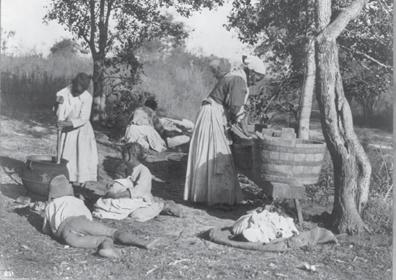
Shakti Castro Camacho ’17MA , Oral historian of the Puerto Rican diaspora
Shanna Farrell, Oral History Center
Tom Kelleher, Old Sturbridge Village
Meghan Gelardi Holmes ’06MA , Colonial Society of Massachusetts
Modupe Labode, National Museum of American History, Smithsonian
Robin Li, oral historian, writer, and independent scholar
David McKenzie, Ford's Theatre
Gregg Mitchell ’18MA , Springfield City Library
Amanda Goodheart Parks ’18PhD, New England Air Museum
Julie Peterson ’16MA , History Colorado
Mark Sawchuk , GLBT Historical Society
Nuri Sherif ’16MA , UMass Center for Women and Community
Amanda Tewes ’17PhD, Oral History Center
Lacey Wilson, Albany Institute of History and Art
Marisa Budlong , Insurrect! Radical Thinking in Early American Studies and Public Seminar
Maya González , Simon-Skjodt Center for the Prevention of Genocide, United States Holocaust Memorial Museum
Melanie Meadors , Robert S. Cox Special Collections and University Archives Research Center
Nicole O’Connell, International Public History Guanhua Tan, New York Chinese Opera Society
Katlyn Durand , Made by History, The Washington Post
Devinne Melecki, Smithsonian Center for Folklife and Cultural Heritage
Barter fellow Devinne Melecki settled in to read at Bridge Street Cemetery in Northampton while researching a piece for Folklife Magazine on American burial.

history interviews, students read the CSM’s meeting minutes, their publication listings, and watched recorded events to contextualize interview questions. Then they completed 11 oral history interviews, which will contribute to the CSM’s institutional archive as well as the Robert S. Cox Special Collections and University Archives Research Center. Finally, CSM hosted their interviewers at their headquarters in Boston for a house tour and to discuss the oral history experience.
Oral history students explore an exhibit during their field trip to CSM headquarters.

This year, the Public History Program partnered with the Colonial Society of Massachusetts (CSM) to conduct a two-semester oral history project. It began in the fall during Professor Sam Redman’s Theory and Method of Oral History seminar. Students spoke with the curator Meghan Gelardi Holmes ’06MA and agreed that they all wanted to examine past insti tutional practices to inform future goals. Some of these goals include improving membership diversity, increasing inclusive historical scholarship, and broadening public out reach. To understand past practices and prepare for oral
In the spring, Katlyn Durand and Kay Mattena continued the collaboration as their field service project for Introduction to Public History, with the specific goals of creating metadata for the oral histories and writing a panel proposal with suggestions for the future. Durand and Mattena listened to each oral his tory and created time-stamped documents to include with each catalog record as a resource for researchers. They also created a panel proposal of scholars, historians, and public historians to discuss how historical organi zations can incorporate more intersectional histories using a decolonization framework. The oral histories, metadata, and panel proposal produced during the year will help to guide the CSM toward a more wide-reaching influence. Allison Smith ’22MA
“We’ll never know where we are going, unless we know where we came from.”
—Rashaun Martin, Colonial Society of Massachusetts
Several faculty, staff, and students were recognized at the university and national level for their achievements in teaching, community engagement, student mentorship, and scholarship. Here are a few of the award winners from this academic year.
In 2021, Professor Richard T. Chu received the Distinguished Community Engagement Award. Chu was selected for the award for seeking out and building relationships with five different Asian American communities in Western Massa chusetts—Bhutanese, Vietnamese, Cambodian, Chinese, and Filipino—and creating a civic engagement curriculum around their needs to narrate and document their own pasts. “Amidst the rise of anti-Asian attacks in the past months and history of anti-Asian racism in this country, the award recognizes the importance of giving voice to and working hand-in-hand with various underserved Asian-American communities in Western Massachusetts,” said Chu.
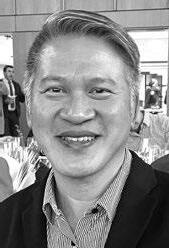
History PhD student Kim Enderle received the Joseph L. Boscov Fellowship, which is awarded annually to a woman aged 35 or older whose studies equip her for service to communities and/or the environment. Enderle’s dissertation research focuses on military service women’s experiences with institutional misogyny and gender violence, which she argues caused irreparable harm to unit cohesion and the combat effectiveness of the U.S. military in the post-WWII era (1945–2015).
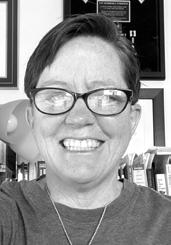
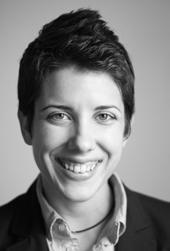
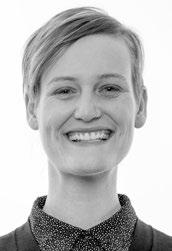
Professor Jennifer Fronc won the 2021–22 Distinguished Teaching Award (DTA). Since 1961, UMass Amherst has presented the Distinguished Teaching Award to instructors who demonstrate exemplary teaching at the highest institutional level. This highly competitive and prestigious campus-wide honor is the only student-initiated award on campus. Students commented on Fronc’s breadth of knowledge, writing that she was “never without an answer” when it came to student questions.
History department Outreach and Community Engagement Director Jess Johnson was recipient of the 2022 Chancellor’s Citation. The only campus-wide award exclusively for staff, the award honors staff for their outstanding contributions to the uni versity. Johnson was nominated by Professor and Dean Barbara Krauthamer in recognition of her work developing the history department’s online educational offerings and other programs and collaborations—including the Feinberg Series, the Ellsberg Conference, and initiatives with local teachers, museums, and more—that bring UMass Amherst to our wider community and our wider community to UMass.
Professor Libby Sharrow received the 2021 Best Article Award from the journal Politics, Groups, and Identities, a flagship journal of the Western Political Science Association. The award-winning article, “Sex Segregation as Policy Problem: A Gendered Policy Paradox,” considers the effectiveness of Title IX, the 1972 federal civil rights law that prohibits sex-based discrimination in educational institutions that receive federal funding. Sharrow also received the 2022 Best Paper Award given by the Education Politics and Policy Section of the American Po litical Science Association for “Legacies of Title IX: The Impacts of Segregation on Policy Coalitions” (with James Druckman).
We Make History, a collaborative project between the National Domestic Workers Alliance and a team of faculty from Smith College and UMass Amherst, including Professor Diana Sierra Becerra, won the Outstanding Public History Project Award from the National Council on Public History. This annual award recognizes projects that contribute “to a broader public reflection and appreciation of the past or that serves as a model of profes sional public history practice” (for more details see page 19).
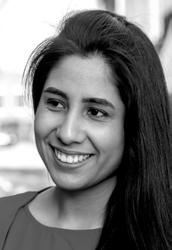 Jess Johnson Libby Sharrow
Kim Enderle
Diana Sierra Becerra
Richard Chu
Jess Johnson Libby Sharrow
Kim Enderle
Diana Sierra Becerra
Richard Chu
Audrey L. Altstadt reports: In spring semester 2022, I offered a new writing seminar based on the book I am currently writing, First In: The Diplomats Who Opened US Embassies in Newly Independent Post-Soviet States. In this seminar, students had the chance to read in depth about the disintegration of the USSR and the emergence of 15 new states. We read and discussed academic and think-tank analysis and strove to emulate different writing styles based on considerations of our potential audience. We examined in detail a few of the new states, read official oral histories of several diplomats that the State Department has collected, and read portions of my draft chapters for the book based on published materials and my own interviews with retired diplomats involved in the new embassies. In these ways, students had the opportunity to see in-progress research and writing and produce their own research papers.
Christian Appy reports: My goal this year was to establish at UMass a permanent Ellsberg Initiative for Peace and Democracy This ambitious project was inspired by the university’s acquisi tion of Daniel Ellsberg’s papers (a treasure trove of 500 boxes), a year-long seminar on his life and legacy, the creation of the Ellsberg Archive Project, and a two-day conference commem orating the 50th anniversary of Ellsberg’s historic release of the Pentagon Papers exposing two decades of government lies about the Vietnam War. The Ellsberg Initiative seeks to build on Ellsberg’s example by promoting public awareness, scholarship, and activism in support of peace, anti-imperialism, democracy, truth-telling, government and corporate accountability, nuclear disarmament, and social and environmental justice. In collabora tion with the history department’s Feinberg Family Distinguished Lecture Series, this year the Ellsberg Initiative is co-sponsoring
its first year of programming on the topic Confronting Empire. I am very grateful for the support we have received from the UMass community and across the country. During last year’s UMassGives we raised more than $10,000. I invite you to visit umass.edu/ellsberg to read more. As I continue work on a biog raphy of Ellsberg, I also published an article for the Boston Review on the U.S. withdrawal from Afghanistan and the disastrous two-decade war that preceded it. I also want to congratulate my former students Jason Higgins and Adeline Broussan on completing outstanding dissertations and receiving their PhDs. Anne Broadbridge taught her usual courses: Muhammad to the Mongols, Islamic Thought, Crusades, and the Mongol Empire. She was delighted to be back in a classroom talking with humans, rather than in her office droning on to a screen, and she weathered the abrupt transitions from masks to optional masks to no masks with only a little fussiness (or so she claims; her family might say otherwise). She was particularly amused by the challenge of re-learning what her students looked like once the masks came off, which was surprisingly difficult, but worth it. Continuing his rotation as Five College faculty, Richard T. Chu taught his signature course Empire, Race, and the Philippines at UMass Amherst and Chinese diasporic history at Mount Holyoke College and Smith College during the fall and spring semesters, respectively. As before, his MHC and Smith College students visited New York’s Chinatown one Saturday, complete with a dim sum lunch and a tour of the Museum of the Chinese in America. Chu also continues to be active in publishing. His essay entitled “Including the Excluded: The Chinaman Question in Filipino American Studies” appears in an edited volume on Filipinx American Studies, and another essay “The General, the
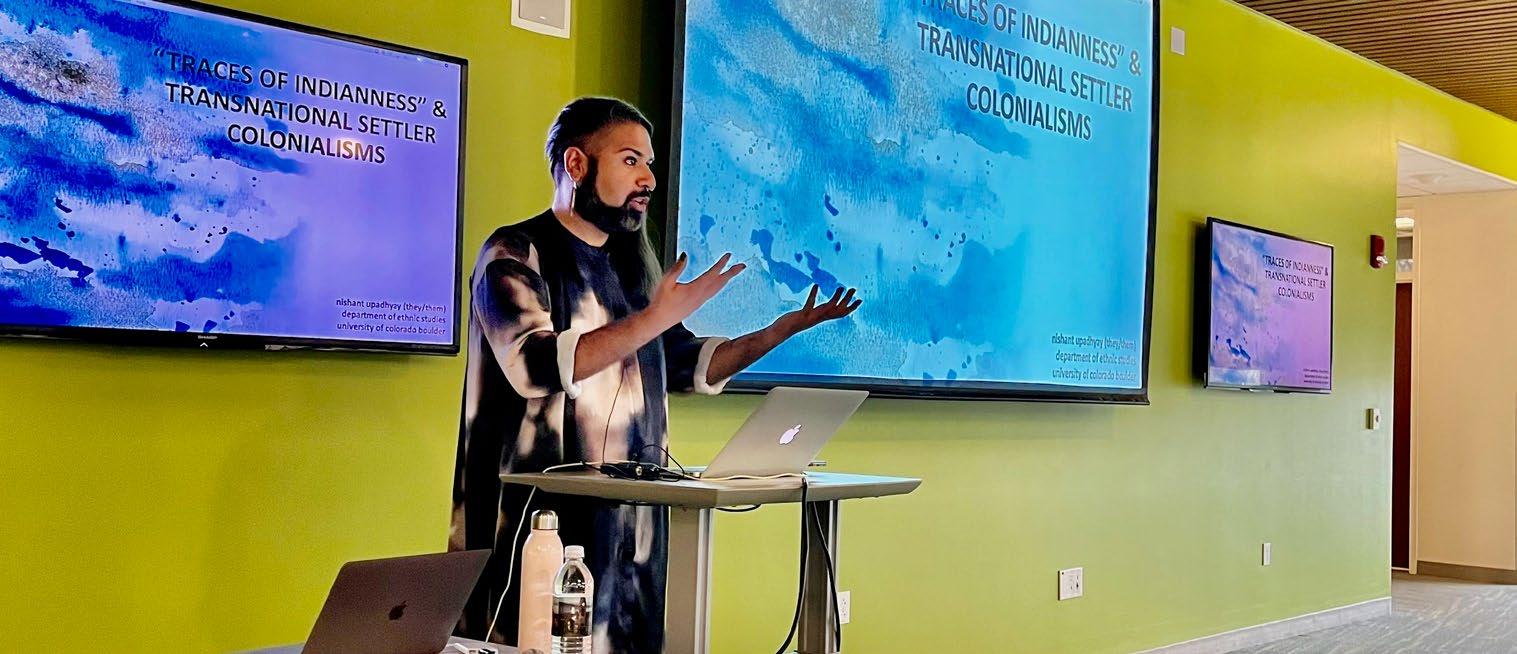
Chino, and the Señorita: Stories from The Manila Times in Early American Colonial Manila” is included in a book on Chinese di asporic communities in Southeast Asia during the early twentieth century. Outside of his teaching and publications, Chu serves as co-chair of the Employee Resource Group for International Fac ulty and Staff, as well as a commissioner of the Asian American Pacific Islander Commission of the state of Massachusetts.
David Glassberg reports: I spent fall 2021 on sabbatical working on a study for Marsh-Billings-Rockefeller National Historical Park on the impact of the Black freedom movement on the U.S. Outdoor Recreation Resources Review Commission, which Laurance Rockefeller chaired. Although the commission existed for only four years, 1958–62, its report illuminating racial disparities in access to outdoor recreation prompted the NPS to add new urban national recreation areas to its long-standing system of rural national parks. I continued to work on this project during spring 2022, while facing the considerable challenge of readjusting to teaching in person for the first time since March 2020. Over the academic year 2021–22, I also co-edited a series of posts for the National Council on Public History’s History@ Work blog on “Public Historians in Our Climate Emergency.” In August, I discussed the contributions that public historians can make to movements for environmental and climate justice at a meeting of the International Federation of Public History in Berlin, Germany.
Daniel Gordon published What Is Academic Freedom? A Century of Debate, 1915–Present. The book is out in paperback and hard back with Routledge and is also available through open access. He also published “Life’s Complexities: Rethinking Barnette, the Flag, Totalitarianism, and the First Amendment” in the University of Massachusetts Law Review. Gordon continues to serve as editor
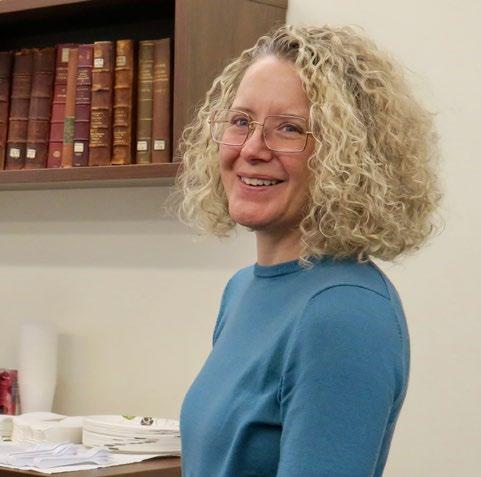
A sociologist by training, Meredith Pustell joined the history department in fall of 2021 by way of the microbi ology department. As undergraduate program coordinator, Meredith advises students, organizes events to engage with the student body, schedules courses for the department, and supports faculty in aiding our students.
Outside of Herter she is a chicken tender and journeywoman gardener, and also attempts to teach herself old-timey skills like embroidery, rice wine fermentation, and weaving wattle fences.
Any and all guests are welcome to stop by her office for advice on classes and the department, for a cup of tea, and perhaps for a conversation that may range from the medicalization of mental illness to prehistoric social forms to the latest science fiction or fantasy novel (or stay firmly in the land of silly wordplay). She has rarely met a random fact she did not squirrel away for later and typically unplanned use, and welcomes the opportunity to learn about whatever topic sparks your interest, though she cannot promise that tangents will not arise in the process.

in chief of the journal Social Science and Modern Society (also known as Society). Among his teaching roles, he supervised four senior theses and taught a junior writing seminar on the First Amendment.
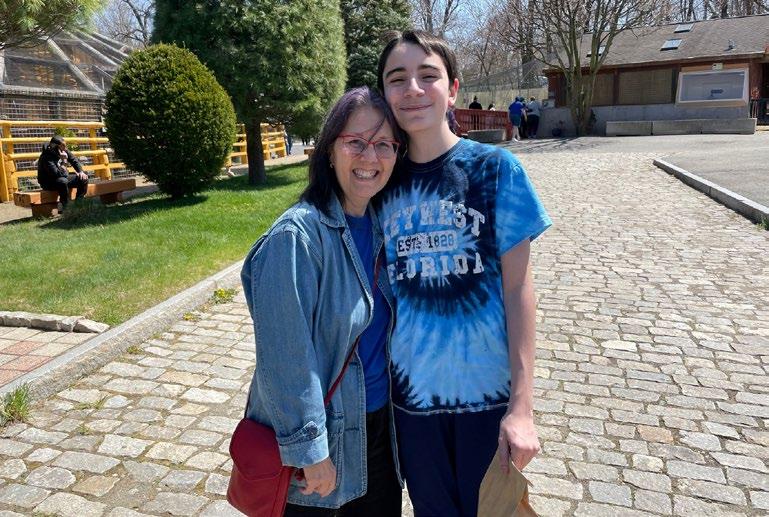
Marla Miller reports: The past year, spent on sabbatical, proved pleasant and fruitful, though not in the ways initially envisioned. With the archive needed for my planned book project closed, I spent the year leading three braided grants (from the National Park Service, National Endowment for the Humanities, and Mass Humanities) that each helped Hadley’s Porter-Phelps-Hunting ton Museum expand and deepen historical understanding in ways that are helping the site become more diverse and inclusive. The work was fun and exciting, especially because I got to re search and learn alongside four crackerjack PhD students: Brian Whetstone, Emily Whitted, and Alison Russell in the history department, and Erika Slocumb, a public history student in the W.E.B. Du Bois Department of Afro-American Studies. In many ways the work was entwined with the Documenting the Early History of Black Lives in the Connecticut Valley project, undertaken with my stellar colleagues Jess Johnson and Kate Freedman ’18PhD, as well as Zoë Cheek ’22MA and Emma Lewis ’22MA, representatives of the Pioneer Valley History Network, and community members. As of this writing, a robust website at umass.edu/connecticut-river-valley-black-history showcases a wide range of resources in the recovery of local Black history, including a database with more than 3,000 archival references. I was also delighted to accept the invitation from the National Council on Public History to co-chair the 2023 annual meeting in Atlanta.
Alice Nash busted out of isolation in October 2021 with a threeweek research road trip to archives in the Midwest, and another eight weeks in summer 2022. For a preview of her new book project, see the online exhibit at www.legip.org. The website was developed by Elizabeth Pangburn. Nash and Pangburn gave a presentation on this work for the Costume Society of America in May. Follow them on Instagram @legipfashion. In the spring se mester, Nash organized a showing of Catch the Fair One, a feature film that addresses sex trafficking and its impact on Indigenous communities. Kali Reis, the star and co-writer of the film, joined the event for a discussion of the film and her own background as a Seconke Wampanoag and Cape Verdean from Rhode Island
who holds multiple world titles in female boxing. She brought her world champion belts for attendees to see, and it was thrilling.
Brian Ogilvie reports: Beyond chairing the department, I presented research at an international colloquium on “Insects & Colours between Art & Natural History.” My book The Science of Describing: Natural History in Renaissance Europe was published in simplified Chinese by Peking University Press. In the spring I taught the modern World History course, which I had not taught since spring 2014; both times I had to revise my lesson plans to address a Russian invasion of Ukraine. I was pleased to serve on the search committee that brought Nandita Mani to UMass as the new Dean of Libraries. Over the summer I worked on a couple research and writing projects in France, Portugal, and the Azores (and did some sightseeing, too).
Stephen Platt is working on a new book about an American marine officer who embedded as an observer with the communist guerrillas of the Eighth Route Army in China in the late 1930s and then tried to import their tactics into the United States Marine Corps during World War II. Platt was recently elected to a three-year term on the Association for Asian Studies’s East and Inner Asia governing council and is helping to plan an exhibit on nineteenth-century China at the British Museum that should open in 2023.
Sam Redman reports: This past year was eventful, to say the least. Most notably, my students were remarkable, completing fresh projects with the Colonial Society of Massachusetts, the New England Air Museum, and the UMass Center for Women and Community. In October 2021, my second book, Prophets and Ghosts: The Story of Salvage Anthropology, was published by Harvard University Press. I enjoyed introducing the book to different audiences during invited lectures at the Smithsonian Institution, Goodhue County Historical Society, the University of
When Steve Manuel ’11 first began his studies as a returning student, he sometimes brought his son Alex to meetings with thenUndergraduate Program Director Alice Nash. Alex would sit on her lap and type while Steve plotted his future. Today, Steve is executive director of the New London County Historical Society and Alex, at 14, is taller than everyone. They recently met for an outing at Lupa Zoo in Ludlow.
Winnipeg, and the Wistariahurst Museum in nearby Holyoke. In May 2022, my third book, The Museum: A Short History of Crisis and Resilience, was published by NYU Press. I enjoyed speaking to several media outlets, including the NPR podcast Museum Confidential, to discuss the book.
Mark Roblee continued to teach Introduction to World Religions and Western Thought to 1600. He is working on a grant-funded project about hymnody in late antiquity, which he presented in short form at an HFA 5@4 gathering during the spring. Over the summer, he attended a weeklong seminar on hymnody in the ancient Mediterranean. In addition to research and teaching in history, Mark organizes the Five College Faculty Seminar in Late Antiquity program and coordinates Public His torians around Boston (PHaB) gatherings. He also contributes to career development services for the college by teaching a career practicum for all HFA majors, advising students, organizing alumni-student networking opportunities, and producing events such as the Diversity, Equity, and Inclusion in the Workplace panel workshop and Humanities and Fine Arts: From Theory to Practice along with history alumnus Bob LaRussa ’76. As a new trustee at the Amherst Historical Society and Museum, Mark has started a public history internship program for UMass students. This fall, he and Internships and Career Advisor Heather Brinn will offer Senior Bridges, a career prep intensive for graduating history majors, as a model for other HFA departments. Sigrid Schmalzer reports: The highlights of my year revolved around human connections—no doubt a common experience in this stage of the pandemic. I was excited to teach a new undergraduate General Education seminar on the history of science activism. Meanwhile, our growing cohort of graduate
and advanced undergraduate students studying modern China created a vibrant and inspiring intellectual community. I deliv ered a talk titled “Toward a History of Science for the People” at a conference on the history of science in East Asia: I noted how lucky I felt to be at UMass, where I could combine academics and activism so freely, and I was moved by the warm response from students and faculty alike. I published a few articles, including a piece titled “Earthy Knowledge” in Science for the People magazine (which I’m very proud to have helped reboot). And our local chapter of Science for the People held a “People’s Science Fair” on Goodell Lawn—an event originally planned for April 2020. It was exactly what we had hoped for and more: community organizers, campus-based researchers, and students engaged in joyful, face-to-face cross-pollination of strategies to harness science for social justice. Here’s to many more days like that!
Diana Sierra Becerra reports: This was my first year at UMass and I have appreciated the enthusiasm and warmth of my students. My colleagues Jennifer Guglielmo and Michelle Joffroy and I won the Outstanding Public History Project Award from the National Council on Public History (NCPH) for our project We Make History. From 2018–21, we worked with the National Domestic Workers Alliance to produce a multimedia suite of tools available in six languages. It includes a digital timeline on the history of domestic worker organizing, four educational videos, biographies and hand-painted portraits of 21 movement ancestors and a website for curriculum facilitators. In May 2022, over 400 domestic workers graduated from the curriculum. I thank my colleague Professor Marla Miller for nominating the project. (See page 19 for more.)
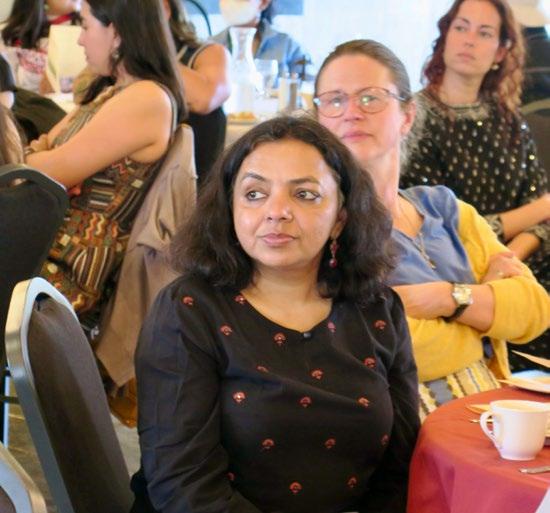
I also produced a TED-Ed animation, “The rebel radio that brought down a war criminal,” which tells the story of Radio
Audience members ask questions after a screening of the film Catch the Fair One. The screening was organized by Professor Alice Nash on the Day of Awareness for Missing and Murdered Indigenous Women and Girls.

Jennifer Heuer reports: It was a joy to return to campus in 2021–22 and to see people again, albeit with masks for much of the year. Among other courses, I taught both the graduate and undergraduate versions of introduction to history, which is a wonderful way to catch up with many of the exciting developments in the field. It was particularly fun to take undergraduates to special collections, and for us to have hands-on experiences after spending so much time looking at the world virtually. We got to work with everything from early twentieth-century yearbooks to old menus and cookbooks to illustrated medieval manuscripts to Olympic gold medals.
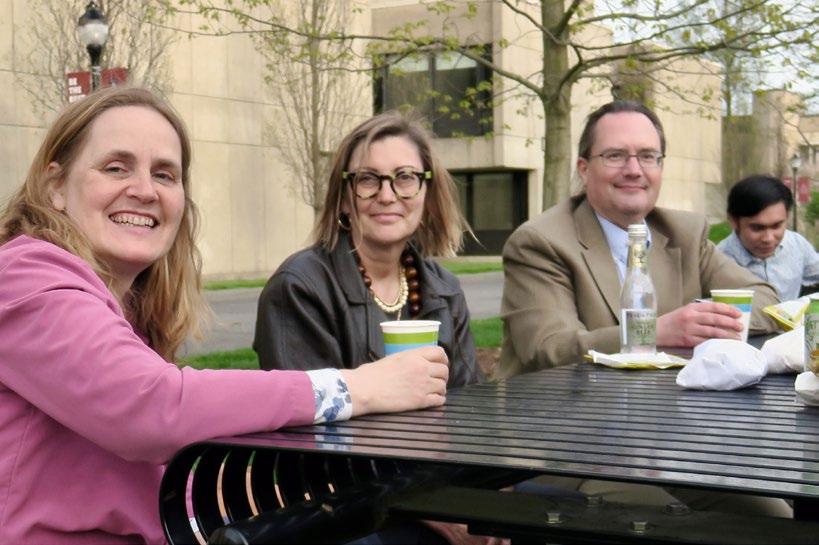
Professionally, I have been especially involved with editing projects this year. I was pleased to edit two special issues for the online academic journal H-France Salon, “Global History, Imperialisms, and the French Revolution,” and another, co-authored with my colleague in art history Gülru Çakmak, “Rethinking Race and Representations in Art History in the Eighteenthand Nineteenth-Century Francosphere.” I am currently co-editing a special issue on European feminisms in the age of revolution for the Annales Historiques de la Révolution française. Along with Christine Haynes at the University of North Carolina Charlotte, I recently be came the editor of the major journal in my field, French Historical Studies. It is both an exciting and somewhat daunting undertaking!

Venceremos, a clandestine guerrilla radio in El Salvador. I pre sented the animation, which currently has over 175,000 views, at the Museo de la Palabra y la Imagen in San Salvador, alongside radio members who spoke of their historic participation.
Libby Sharrow had a busy year of teaching and research in the Department of History and the School of Public Policy! They are thrilled to announce that their first book, Equality Unfulfilled, is forthcoming with Cambridge University Press. The book tackles retrospective questions on the impacts and legacy of Title IX of the Education Amendment of 1972, a key U.S. civil rights policy. Sharrow participated in observing the 50th anniversary of Title IX in many ways (detailed on page 31). Sharrow also serves on the UMass Public Engagement Project Advisory Board and was the 2021–22 president of the Women’s Caucus for Political Science. They are thrilled to continue collaborations that bring research on the histories of public policy to scholarly and public forums. For her scholarship, she was awarded two best manuscript awards from professional associations in political science.
Asheesh Siddique reports: I spent an incredible, exhilarating year completing my first book, tentatively titled The Experience of the Archive: Knowledge and the Making of the Early Modern British Empire, while holding a fellowship at the Institute of Advanced Study in Princeton, N.J. The book is under contract with Yale University Press, and it will hopefully be published sometime in 2023 or 2024. It was an extraordinary privilege to spend time at the Institute, which provided an ideal environment to think and write. New scholarship from a nascent second project on early American legal history will appear in 2023 in the journals Early American Studies and Law & History Review. I also gave
invited talks at the University of Georgia, Yale University, and the University of Pennsylvania (the latter in person!).
Garrett Washington reports: I spent a sabbatical year in Paris as a visiting researcher at the Centre des Études sur le Japon, a unit within the Ecole des Hautes Etudes en Sciences Sociales. I enjoyed presenting my ongoing work on Japanese Protestant women and imperialism and on my new critical historical biography of entrepreneur, philanthropist, and activist Hirooka Asako (1849–1919), as well as participating in roundtables and seminars. I also began collaborating with historian Alexandre Roy on publishing an article analyzing her unprecedented role in mining in Japan and made great progress on the Hirooka Asako biography project. After more than two years of waiting, the slight loosening of travel restrictions related to COVID-19 in early spring 2022 allowed me to finally make a research trip to Japan. In Tokyo, Osaka, Kyoto, and Fukuoka, scholars, archivists, and a very generous public relations director welcomed me warmly and made my trip an efficient and fruitful one. The year was also marked by the publication of my first monograph, Church Space and the Capital in Prewar Japan, by the University of Hawai‘i Press in hardback and in digital formats and an invitation to join the board of trustees for the society that publishes the Journal of Japanese Studies.
Joel Wolfe reports: I had a productive year in all three facets of my life as a faculty member. I began my first year as the graduate program director, and very much enjoyed working with our grad uate students in so many interesting fields. I also taught a course

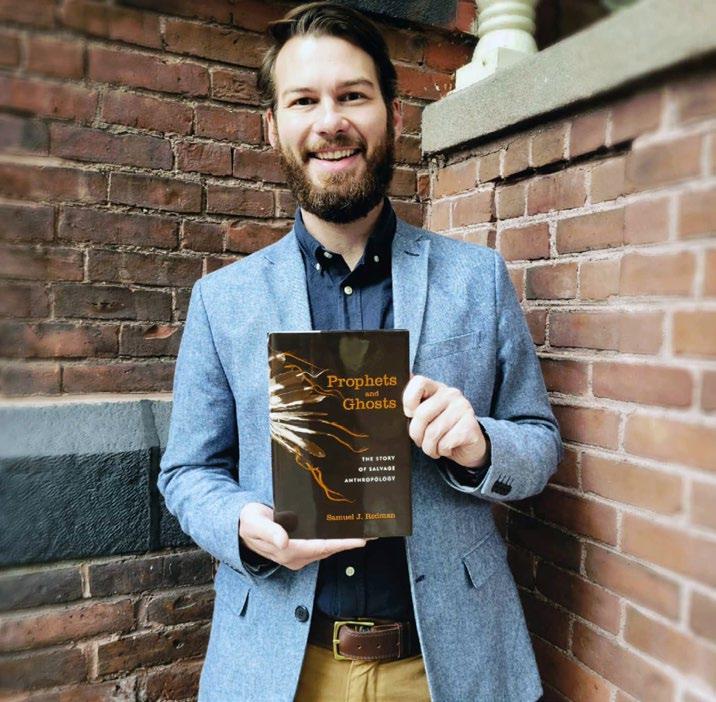
overload in the fall, and had the opportunity to teach my Junior Year Writing Seminar on the history of American gridiron football. Students wrote papers on everything from UMass’s move to the NCAA Football Bowl Subdivision to the role of so-called muscular Christianity in the rise of the sport in the late nineteenth and early twentieth centuries. One paper, which I believe helped a student win a prize at the Commonwealth Honors College, analyzes sexual violence in some college programs, as well as university administrators’ weak responses to it. I also completed work on an essay putting the 1919 Winnipeg General Strike in a hemispheric context. That piece is part of For a Better World: The Winnipeg Gen eral Strike and the Workers’ Revolt, published by the University of Manitoba Press in fall 2022. Finally, I have just about completed a manuscript for Polity Press on Brazil’s modern political economy entitled Brazil: An Incomplete Country. It is almost done because the editors want the final few pages of the last substantive chapter to address the October 2022 general election. That book is slated to be published in March 2023.
Kevin Young reports: I had a pretty good year given that the world is in flames. The return to classroom teaching went surprisingly well due to my students’ hard work and spirit of solidarity (almost all kept wearing masks even after the administration abruptly lifted the mandate in March). In the research realm, I was happy to be able to publish an article on peasant unions and military dictatorship in Bolivia in Hispanic American Historical Review plus an essay on revolutions in Latin American Research Review
Garrett L. Washington is the Department of History’s newest tenured faculty member. A historian of modern Japan, women, gender, and religion, Washington is the editor of Christianity and the Modern Woman in East Asia (Leiden: Brill, 2018), winner of the 2020 College of Humanities and Fine Arts Outstanding Teaching Award, and author of Church Space and the Capital in Prewar Japan (Honolulu: University of Hawai‘i Press, 2022).
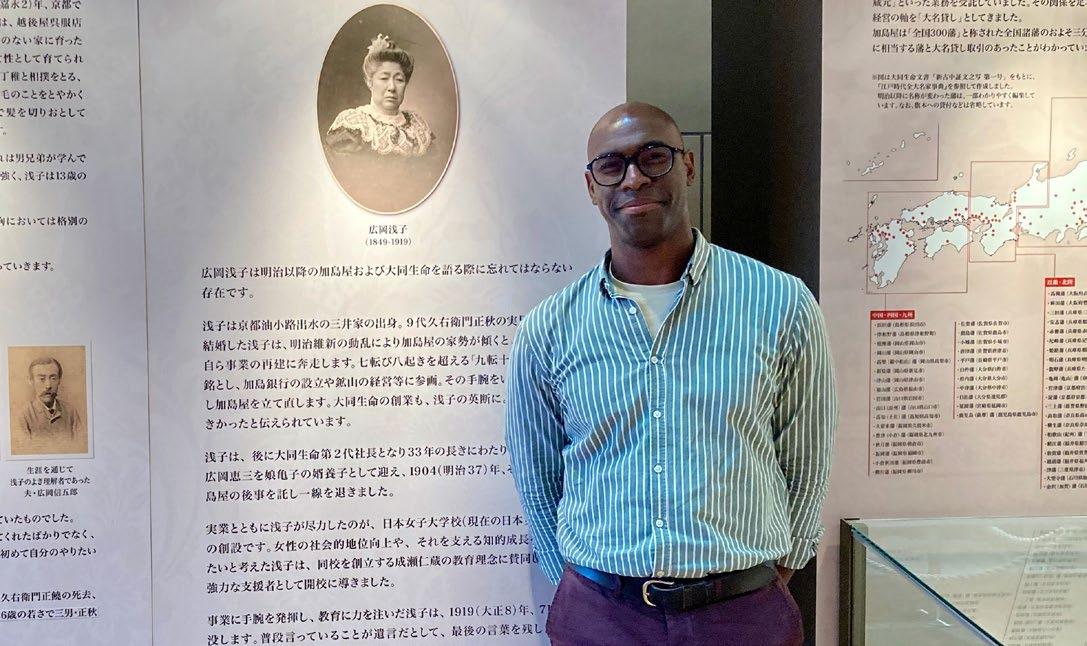
Can you tell us about your work, in a nutshell?
My first, super-long project—now a book, Church Space and the Capital in Prewar Japan—was basically trying to answer a nagging question: Why do Protestant Christians, who were a very tiny part of the Japanese population, loom so large in the historiography of modern Japan? I found that Protestant spaces, particularly schools (which have been studied quite a bit) and churches (which have
not been studied much in their own right) were key to answering that question. My work reveals where, how, and for whom urban churches were built; how the Japanese educated elite preached, lectured, organized, and mobilized in the church space; and what impact all of this had on Japan. Where is your scholarship headed next? The term “good wife, wise mother” brings to mind the restrictive social roles and rights of elite women in early modern Japan, as well as the reformatted misogyny that the new, mod ernizing Japan generalized to all women. But a few women still managed to build public and professional lives well beyond the frameworks approved for women. Using the lens of space (again!) and the medium of the critical biogra phy of one exceptional woman, I’m studying how this was possible and how it complicates our understanding of the rigid gender constructs of modern Japan. My project focuses on Hirooka Asako, daughter of the leading banking family in mid-nineteenth century Japan. Although she experienced tremendous pressure to conform, was forbidden from studying, and was married
off young, Hirooka educated herself; built a banking, mining, and insurance empire; and was the primary fundraiser, promoter, and benefactor for Japan’s first university for women. And physical and social space were central to the limits that confined her and how she overcame them.
Basically, I work on a project that interests me and then I become fascinated with some small aspect of that research that then becomes the focus of another research project. So, looking back, I can see the lines connecting my work on Protestant churches to missionary hospitals, Christianity’s relationship with the women’s movement in Japan, Buddhism’s spatial response to Christianity, and my current project on entrepreneur, philanthropist, and latelife Christian convert Hirooka Asako. Over the past ten years, my work has been more and more focused on Buddhism and Shinto as well. I’d like to write a history of the rebuilding of Shinto Shrines in postwar Japan, which would really bring things full circle, I think.
Outside your scholarship, you produce your own podcast, too?
Yes! I published a podcast series this year, although it is not directly related to history (aside from its potential as a source for future historians). It is called “Black Men We Know.” In it I introduce listeners to black men succeeding in a variety of fields who defy common assumptions and stereotypes while trying to maintain positivity and humor. I’ve talked with an architect, a life coach, an artisan woodworker, a nonprofit founder, a Silicon Valley IT exec utive, a circuit court judge, and a therapist, and every conversation was illuminating and inspiring. Hopefully my fifty or so listeners thought so too!
What is one thing that many people don’t know about you?
That I used to play professional rugby, and that, as of right now, I’m still playing at the amateur level. It’s been a part of my life since I was eighteen, so I think knowing that reveals a lot about me.
What is one piece of advice you offer to students?
My PhD advisor used to say: “This is YOUR education, and it needs YOU in it.” Old-fashioned but still excellent advice. Study what interests you, write about topics that interest you the most, raise your hand, make sure you take the time to do the readings, make sure you talk to the professor during office hours or in pass ing, think about what you want out of your education, and figure out how you can go get it. We’ll do all we can to help you do all this.
This interview was adapted from a longer version by MA student Nick DeLuca published in the department’s blog Past@Present.
THIS PAST SPRING, the UMass Amherst history department co-presented “Telling the Truth about History” with the Wolfsonian Public Humanities Lab at Florida International University and numerous co-sponsors. As Wolfsonian deputy director and former professor in the UMass Amherst history department Julio Capó Jr. stated in his introduction to the event, “In no uncertain terms: the teaching of accurate history is under attack…. [Efforts] to curb the telling of accurate history have largely taken form through new legislation across the country. Today’s program is a conversa tion with scholars, political leaders, and teachers who are actively thinking about these issues, and who will address the ongoing national assault against teaching accurate and evidence-based history at the K–12 level, and increasingly, at the community college and university levels— efforts that impact us all as a society.”
Panelists included Florida State Senator Shevrin Jones, education scholars Jennifer Rich and Raphael Rogers, and UMass historians Laura Briggs and Barbara Krauthamer (moderator).
VIEW THE EVENT READ MORE OF THE INTERVIEW
How would you describe the evolution of your work over time?
Joyce Berkman reports: I am writing this entry at a time when women’s employment and educational freedom and marital sexual equality are threatened, as they were for several centuries, by bans against their reproductive freedom. Since I taught under graduate courses in the history of reproductive rights/justice for many years, I find the recent SCOTUS overturn of Roe v. Wade federal protections “disastrous,” to borrow the word of the dissenting judges. I am happy to report that the Massachusetts Review recently published my essay on Roe’s reversal (see below for more).
This has been a year of considerable professional work. In late April I submitted a book-length manuscript, already contracted, on Edith Stein’s autobiography to be published by Rowman and Littlefield. A talk that I gave remotely in Mexico in October on Edith Stein’s gendered philosophy and theology will appear in a forthcoming volume on Stein. Erik Moshe, editor of History News Network, is printing
an interview that focuses on my passion for history and for teaching. No longer president of the Retired Faculty Association, I serve now as program chair. We’ve mounted a series of stimulating monthly events. It is with so much joy that each year I can come to know the recip ient of my endowed award (see photograph of Emily Whitted and me).
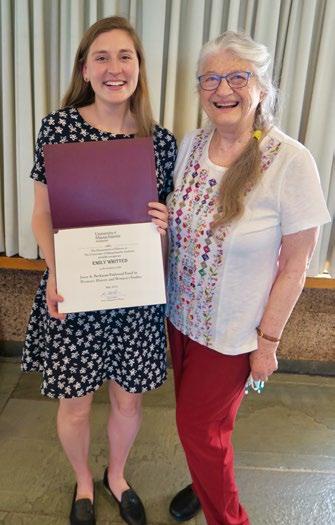
I continue to find deep solace and ex citement in my piano studies and workshop performances. A huge distraction this spring and summer was the renovation of our home’s downstairs. Lenny and I plan to “age in place,” which requires major structural changes.
I miss teaching when, more than ever before, critical thinking skills and empathic un derstanding are vital to democracy’s survival.
Robert E. Jones reports: COVID-19 brought a halt to the traveling my wife and I have done every year since I retired, but it also brought me one benefit. By forcing me to stay home, COVID led me to finish my book about my
“In my decades of teaching women’s history and the history of reproductive rights and justice, I don’t think my students or I ever anticipated that the U.S. Supreme Court would reverse Roe v. Wade, as happened in a 5-4 decision on June 24th of this year in the case of Dobbs v. Jackson Women’s Health Organization.”
THE UMASS AMHERST HISTORY DEPARTMENT has a longstanding reputation as a nexus for the study of the history of reproductive rights and justice, owing in no small part to the foundational work of Professor Emerita Joyce Berkman, who was faculty in the department from 1965 to 2013. (Today, numerous students, alumni, and faculty, including Professors Jennifer Nye and Laura Briggs, study, teach, write, and develop public programs in this field.) In the wake of this summer’s overturning of the 1973 Roe v. Wade decision, Berkman reflected on episodes related to reproductive rights in her personal and academic life—including here in the UMass Amherst history department. Published in the October online edition of the Massachusetts Review, the essay “Roe: Telling the Tale” illuminates the history of key political, legal, and societal developments since the colonial era.
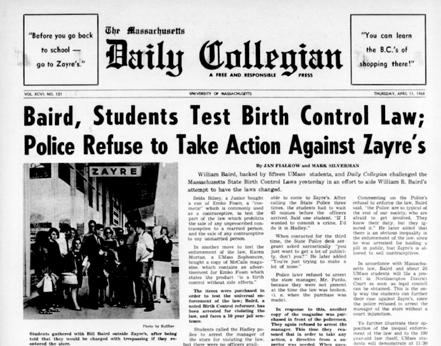
engagement with Russia and the Soviet Union over more than five decades. I had been working on the book on and off for five years. Now it is finished and published. It is probably the last book I will ever write.
Jane Rausch reports: During the past year I have continued my research on Colombian topics. The Banco de la República included a Spanish translation of my article “Bicycling in Colombia: The Development of a National Passion,” which was first published in English in 2020, in its traveling exhibi tion, Escarabajos: Un país descubierto a Pedalazos (2021). This spring The Hispanic Journal published my article, “Opening the Gateway to South America at mid-29th Century: The Re markable Life and Work of Kathleen Romoli (1897–1979).” Revistas Memorias Uninorte (Barranquilla) published another manuscript, “The Development of Baseball in Colombia—A Caribbean Anomaly?,” this September.
Along with my other three ongoing manuscript projects, Alberto Espitia produced a podcast dealing with my work for his radio series “Señales de Vida,” which aired in Villavicencio in April 2022. Additionally, a project archivist is helping me with my most daunting challenge: cataloging my extensive library on Colombian history for donation to an institution in Colombia where the works will be of greatest use.
Shelving books at Jones Library, being a “Friendly Visitor” for the Amherst Senior Center, and writing the pro gram notes for the Holyoke Civic Symphony are enjoyable volunteer activities, but my greatest delight is continuing my quixotic effort to master Olympic weightlifting.
Charles Rearick reports news from the age of COVID-19: After a one-year break awaiting the new vaccine, I resumed my twice-a-year two-month stays in Europe. Last spring, I launched another illustrated article into cyberspace to convey some of the ideas about Paris I’ve crystallized in recent years. My focal point has shifted from Paris overall to a historically working-class neighborhood called Belleville. I’ve been living there regularly several months each year over more than a decade and learning a lot about it. Like most of Paris outside the central districts, it is not the mon ument-rich city of luxury and glamor that is world famous. Yet, I’ve learned, it has played an extraordinarily important role in Parisian history. And it has its own distinctive history, in which ordinary people are the principal actors. Belleville was once a bastion of the Commune (1871), then a hotbed of socialist and anarchist movements, then a leading landing spot of immigrants from around the globe, a primary target of tabula-rasa urbanist operations (post-1945), and now a prime example of “social mixing” (with gentrification well underway). My short article “More Paris” appeared in the open-access English magazine Berfrois
June 23, 2022, marked the 50th anniversary of Title IX, a U.S. law that protects against sex-based discrimination in American schools, colleges, and universities. UMass Amherst history and public policy Professor Libby Sharrow, a leading scholar of Title IX’s history and legacies, was a prominent voice in marking this anniversa ry. Sharrow penned the policy recommendations of the Women’s Sports Foundation landmark report on the 50th and gave multiple media interviews, including to the New York Times and Mother Jones. They were invited to write about the history of Title IX for the Washington Post and the Women’s Media Center, and they pro vided expert commentary in the ESPN docuseries 37 Words, which aired in June. She also gave many talks to academic and public audiences.
For the Women’s Media Center Sharrow concluded that “an evaluation of Title IX at 50 calls for genuine celebration of the successes of policy, alongside sober vigilance and creative visioning to guide future activism. As much as has changed in the first half-century of sex nondiscrimination policy, equally abundant concern remains. We will need to hold these two lessons simultaneously to pursue the future push for gender equality.”
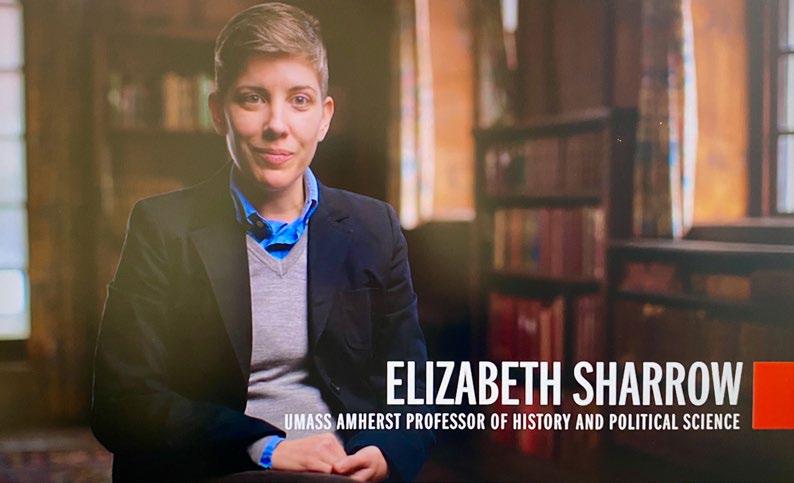
With the support of the Fulbright “Con il sud” grant, Ross Caputi built a website with a backend database to preserve an endangered Italian language called Saponarese. Spoken only in the remote mountain village of Grumento Nova, Saponarese is like dozens of other Italian languages (usually dismissed as dialects) that face extinction. Ross’s work bridged the fields of language documentation, public history, and cultural preser vation. However, unlike traditional language documentation projects that focus on recording and preserving linguistic data, Ross’s website seeks to present his data in an engaging and in teractive way. By linking grammar with cultural and educational materials, Ross hopes the website, Memoria e lingua grumentina, will support future language revitalization efforts.
Katlyn Durand had a successful first year settling into life as a graduate student. In the fall, she participated in an oral history project as part of Professor Sam Redman’s Theory and Method of Oral History course. In Redman’s Introduction to Public History course in the spring, Katlyn and her collaborator and friend Kay Mattena began work on phase two of the project, which includes creating a panel proposal grounded in the oral histories. She also worked as a teaching assistant for Professor Christian Appy ’s Social Change in the Long 1960s course. Katlyn spent the summer digging through whistleblower Daniel Ellsberg’s papers located at the Robert S. Cox Special Collections and University Archives Research Center as a research assistant for Appy and interning for the Washington Post’s Made By History. As for the upcoming year, she is looking forward to starting work on her master’s thesis!
In this past year Yuri Gama published a peer-reviewed article in a Brazilian academic journal about the intersection of public housing and citizenship in the historical city of Recife. As a public historian, Yuri presented via Zoom at the National Council on Public History conference. His presentation explored his own
research on the relation between infrastructure and marginalized communities in Brazil and the United States. In order to continue his dissertation, Yuri received the Potash Travel Grant. This fall, he came back to work at UMass Amherst, teaching the 4-credit course Modern Latin America through the Residential Academic Program. For 2023, Yuri had his panel proposal for the next American Historical Association conference accepted.
Maya González is grateful to have worked on various profes sional projects this year in addition to her coursework. For her work as a TA, Maya was a finalist for the Distinguished Teaching Award. As the program intern at the Center for the Prevention of Genocide at the United States Holocaust Memorial Museum, she learned about restorative justice. She conducted research on the contemporary Rohingya genocide, wrote two articles for the Cen ter’s blog, and contributed to their social media presence. As the librarian at the Institute for Holocaust, Genocide, and Memory Studies on campus, she catalogued and shelved over 2,000 books for student access. Over the summer, Maya participated in an intensive Yiddish-language-learning program at the Yiddish Book Center that energized her for future projects in Jewish history.
Andy Guan ’22 began his studies at UMass as a computer science major but fell in love with history in his first semester. During his time at UMass, he took classes in Asian, European, and U.S. history, including a graduate and advanced undergradu ate seminar on modern China. For his senior thesis, he returned to his interest in computers by exploring the history of the semiconductor industry in the People’s Republic of China. Seth Kershner reports: After finishing coursework for the PhD program this spring, I spent the summer preparing for comps and traveling the Midwest for grant-funded research. July saw the transformation of more than 10 years of research and co-writing with my mentor, Scott Harding, into a co-authored book, Breaking the War Habit: The Debate over Militarism in American Education,
RIGHT PhD student Ross Caputi and his cousin Miriam Caputi film an instructional cooking video in the local language (Saponarese).

FAR RIGHT Andy Guan ’22 at the history department commencement breakfast with, from left to right, his mother (Yuyu Li), thesis advisor (Professor Sigrid Schmalzer), and family friends (Miaoxian Xie and Boquan Wu).
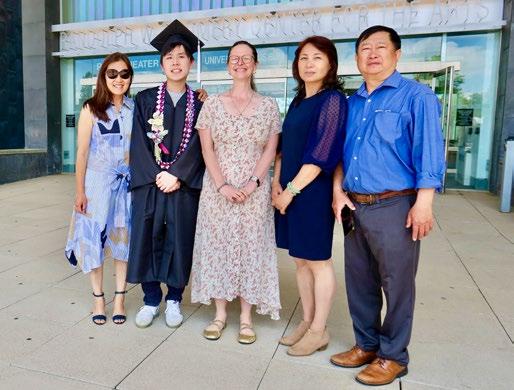
FAR LEFT (left to right) Public history student Katlyn Durand, PhD student María Belén Portilla Moya, Nehru-Fulbright Doctoral Research Fellow Parul Srivastava, and public history student Marisa Budlong at Old Sturbridge Village during the annual public history field trip.

LEFT During their last meeting of 2022, the undergraduate history club took over the sixth floor of Herter Hall for a late-night game of hot lava.
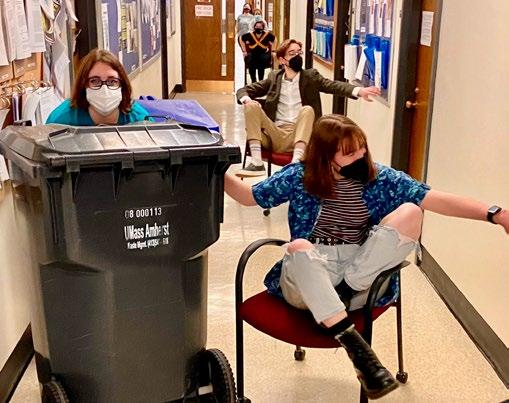
published by the University of Georgia Press. I also continued work on the subject of my MA thesis, police surveillance of activist groups in the 1960s, and had a short piece published in the quarterly journal New York Archives. After comps this fall, I plan to begin working in earnest on my dissertation. Tentatively titled “Can’t Jail the Truth: Vietnam Era Dissent in the American Military Prison,” this project combines my two abiding academic interests: the carceral state and ’60s social movements. In November, I traveled to New Orleans to present some of my dissertation research at the annual meeting of the American Studies Association.
Melanie Meadors reports: Starting a graduate school adventure as a first generation college student in a year of pandemic, po litical/social strife, and personal loss was not ideal, but I quickly realized I was in my element, surrounded by people with diverse viewpoints who didn’t judge my various idiosyncrasies (the phrase “classic Mel” has become a standard among my cohort, which I accept with pride). I will be forever grateful to my fellow students and the history faculty who helped me navigate (a.k.a. flounder through) this difficult year of figuring out my academic identity. After working on several projects, I realized I was driven by questions like “Who owns/has access to history?” I’ve had several of my pieces published this year, including my three-part series about the history of women and bicycles at GeekMom (reprinted at the Past@Present blog), and “Pliny Moody’s ‘Turkey Tracks’” in Prehistoric Times magazine. Over the summer of 2022, I completed an internship at the Robert S. Cox Special Collections and University Archives Research Center, processing collections that focus on social change, which I wrote about in Past@Present. It’s been a life-changing experience, and I can’t wait to take the next steps in my career as an archivist/activist. Shay Olmstead reports: This year was productive! I continued writing my dissertation, “‘Refuse to Run Away’: Employment Discrimination Lawsuits as Transsexual Activism, 1970–1990,” and published an editorial for the Washington Post’s Made by History column. In June, I presented a paper titled “The ‘Cis
State’: Medicine, Law, and ‘Biological Sex,’ 1970–1990,” at the Committee on LGBT History’s annual Queer History Conference in San Francisco. I was recently accepted as a 2022–23 fellow for the UMass Center for Law, Justice, and Society (CLJS). I will spend the fellowship year transforming the third chapter of my dissertation into a journal article and will present my work at the American Society for Legal History’s annual meeting in Novem ber. I had the privilege of teaching three courses this year: History of Western Science and Technology II for the RAP program in the fall, and U.S. LGBT and Queer History in the spring and summer. I loved watching my students make connections between past and present. I have a number of projects in the works for next year and am excited to keep the momentum going!
Alison Russell finished the second year of her PhD program, grateful to learn, teach, and collaborate in person. As a co-chair of the Graduate History Association, she helped plan this year’s UMass Graduate Student History Conference “Subject to Change,” along with other social and professional events to support her fellow graduate students. Alison was a recipient of the Henry F. May Award from the Society for U.S. Intellectual Historians and presented on their New Voices in Intellectual History panel. She has also been doing research for the Por ter-Phelps-Huntington Museum under a grant from Mass Humanities. This has included presenting research on Atlantic slave economies in Hadley—both in person and on Zoom. She has also worked on Teaching with Historic Places, a digital initiative of the National Park Service, designing lesson plans and teachers’ guides. Her publications from this year include “Raising New Questions: Reframing the Semiquincentennial with Resources for Educators” for NCPH’s blog History@Work and an entry on Wilma Mankiller for the encyclopedia Women Who Changed the World: Their Lives, Histories and Accomplishments. She researched her dissertation prospectus this summer at the Massachusetts and New-York Historical Societies thanks to both a Massachu setts Historical Society Short-Term Fellowship and the Richard Gassan Memorial Scholarship from the history department.
Keynote: U.S. Policy in the Global South Nobel Peace Laureate Dr. Rigoberta Menchú Tum, Vincent Bevins, Amy Goodman, Online
The Imperialist Roots of the U.S.A. Manu Karuka, UMass Amherst Student Union Ballroom & Online
U.S. Empire in Asia and the Pacific Nerissa S. Balce, Brian Hioe, Moon-Ho Jung, Sigrid Schmalzer, Online
The Human Toll of America’s Air Wars Inaugural Ellsberg Lecture by Azmat Khan, UMass Amherst Student Union Ballroom & Online


Vietnam Era Antiwar Movement: Successes, Failures, and Legacies Nguyet Nguyen, Carolyn Eisenberg, Daniel Ellsberg, Ngo Vinh Long, Judith Ehrlich, Online
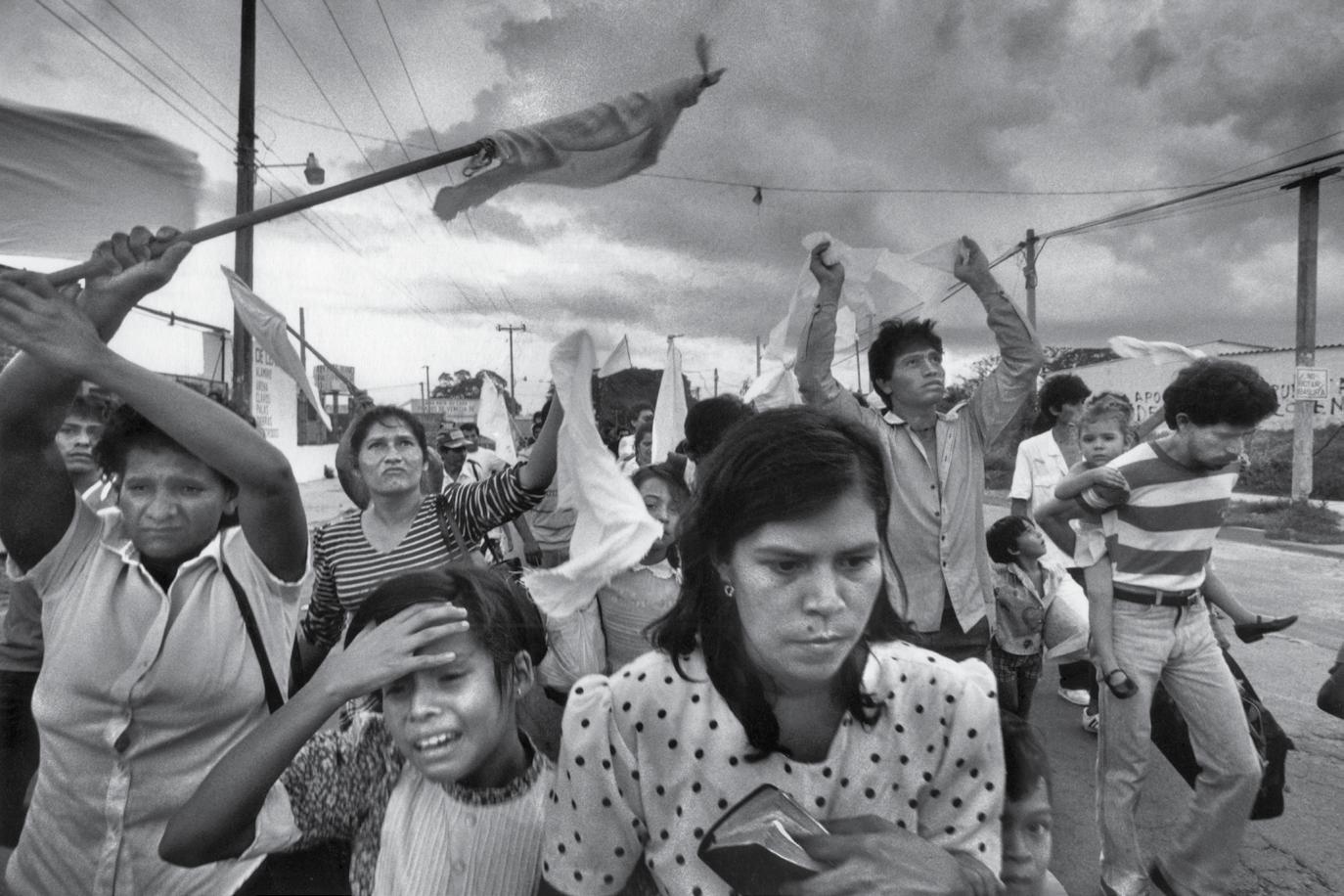
None of Us Is Free Unless All Are Free: Anti-Imperialism and the Black Radical Tradition 2023 James Baldwin Lecture by Bill Fletcher Jr., UMass Amherst Bowker Auditorium & Online
Feminists Against Empire: Resistance to U.S. Sanctions and Embargoes Liz Oliva Fernández, Alejandra Laprea, Diana Sierra Becerra, Online
Resisting Imperial Memory in Iraq Dave Inder Comar, Kali Rubaii, Nazli Tarzi, Ross Caputi, Online
The Poetry of War and Resistance Carolyn Forché, Yusef Komunyakaa, Dunya Mikhail, Ocean Vuong, Ru Freeman, Online

Allison Smith ’22MA spent her final year in the master’s program writing her thesis “Historic Houses and the Food Movement: Casey Farm and Coastal Growers’ Market.” She also worked at Historic New England writing a best practices and inclusive description guide for archival collections. After gradu ation Allison moved to Mystic, Conn., to work as a public programs and events associate at Mystic Seaport Museum. Additionally, she is on the social media committee for the Dublin Seminar of New England Folklife.
Brian Whetstone finished his fourth year in the program teaching inde pendently as an instructor of record during the spring 2022 semester for History 382: The City in Modern U.S. History. Students in the course examined the history of U.S. cities from 1876 to the present day, including the intersection between cities and women’s and gender history, the history of the Black free dom struggle, and the rise of contemporary neoliberal politics. Brian also taught online for the University Without Walls program, leading students in History 385: Modern Boston through a six-week course examining Boston’s urban his tory and relationship to environmental history, gentrification, and suburbaniza tion. In addition to teaching responsibilities, Brian concluded a full draft of his dissertation, preparing to defend in November 2022. Throughout the academic year, Brian worked with Professor Marla Miller to update and expand National Register of Historic Places documentation for the Porter-Phelps-Huntington Foundation in Hadley, Mass., a project that concluded and coincided with the museum's celebration of reinterpretation initiatives led by Emily Whitted, Alison Russell, and Erika Slocumb in June 2022. The project was funded by a National Park Service Underrepresented Communities grant to develop the original 1973 National Register nomination into a roughly 100-acre historic district that explores the site’s labor, women’s, and cultural history. Finally, Brian presented his research at a number of professional conferences, including organizing a panel on new directions in the history of historic preservation for the 2022 Organization of American Historians conference in Boston; present ing on a panel for the African American Intellectual History Society’s 2022 conference; and presenting as distinguished speaker for the Osher Lifelong Learning Institute annual lecture in the Berkshires.
Alongside coursework, Emily Whitted spent her past year engaging in public history work locally and abroad. In fall 2021 she helped to organize the Industrial Crafts Research Network’s inaugural symposium across multiple time zones, and in spring 2022 planned the annual UMass Graduate Student History Conference alongside her fellow GHA members. In fall 2021 she began a yearlong position with the Porter-Phelps-Huntington Museum in Hadley, Mass., as part of a larger reinterpretation grant funded by the National Endowment for the Humanities involving Professor Marla Miller, history PhD students Alison Russell and Brian Whetstone, and public history and Afro-American Studies PhD student Erika Slocumb. Whitted also completed an archive-digitization project with the Leverett Historical Society and then traveled across the Atlantic in spring 2022 as a short-term engagement fellow for the Framework Knitters Museum in Ruddington, England, to research and design new exhibit components for their site. She also had the opportunity to present work in person at the Colonial Williamsburg Antiques Forum and virtually at conferences for the American Psychological Association, our depart ment’s GHA, the National Council on Public History, and the Dublin Seminar for New England Folklife. This summer she worked as an exhibit research assistant for the Mercer Museum and Fonthill Castle to support an upcoming exhibit on the Doans, America’s first outlaws.
WITH SUPPORT FROM the Potash Travel Grant, María Belén Portilla Moya traveled to Quito, Ecuador, in the summer of 2022 to kickstart her doctoral research. A his torian of cartography focused on colonial Latin America, especially the northern Andes, Moya is pictured here at the Centro Cultural Biblioteca Ecuatoriana Aurelio Espinosa Pólit with a map of Ecuador that depicts historically significant territorial limits. Moya’s goal for her scholarship is to “describe history through the eyes of the map.”
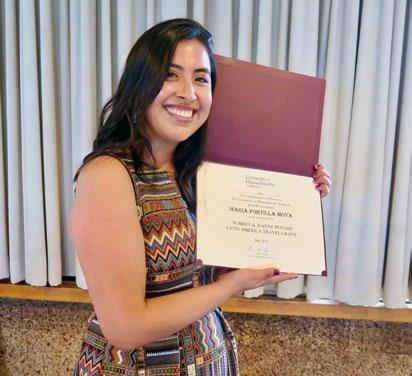

Dan Allosso PhD’17 reports: In addition to my American Environmental History and Modern World History OER textbooks, available in the Open Textbook Library, I have just added How to Make Notes and Write, a short handbook on research and writing that is available free as a remixable OER with a CC license and on Amazon in a print version.
Thomas Army ’14PhD reports: This past year I was one of three faculty members to receive the Excellence in Teaching Award from Quinnipiac University. I continue to teach as an adjunct at Quinnipiac and Quinebaug Valley Community College in Danielson, Conn. This June (2022) I completed my 25th YouTube video as part of my series on eighteenth- and nineteenth-century American history. Just search Tom Army to find them. I’m working on two research projects, and my wife and I have taken our six-year-old granddaughter to Mount Vernon, Monticello, Petersburg, Antietam, and Gettysburg. You can never start them too young.
Colonel Beth Behn ’04MA, ’12PhD reports: I remain on active duty with the army. I just completed a year serving on the army staff in the Pentagon and in June 2022 assumed duties as the chief of transportation/commandant of the U.S. Army Transpor tation School. Julie and I will celebrate 20 years of marriage in November. We were married in Grace Church, Amherst, during my first year of graduate school, so UMass holds a very special place in our hearts.
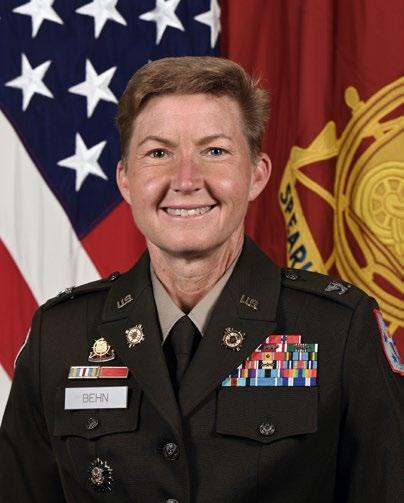
Lorrey James Bianchi ’69 reports: After leaving the university with my degree in European history, I had a very successful ca reer in the financial services industry in information technology. Along the way on that 37-year work journey, I acquired an MBA for my career and most of a PhD in French and German history for fun. The best part of my life has been my lovely spouse, Kathy (Michigan State ’69). While enjoying our home in Boston’s Back Bay and many, many trips to Europe with her, I have amassed a 1700-item collection of French Second Empire materials. We have also been strong supporters of the university libraries at UMass and at Michigan State. We’re enjoying retirement and have remained in Boston through winters, Patriots Super Bowls, last-place Red Sox finishes, and the ever-hopeful return of spring baseball.
Jeff Bradway ’87BA, ’95MA has been stay-at-home dad to his two sons and has been involved with local history projects in and around Pittsfield, Mass. He serves on the Pittsfield Historical Commission, the board of trustees of the Berkshire Music School, and the board of trustees of Pittsfield Cemetery. He has taught at Berkshire Community College and has lectured for the local Osher Lifelong Learning Institute. In 2014 he co-wrote History of the Colonial Theatre, Pittsfield, Massachusetts, which was recognized as outstanding book of the year by the Theatre
Historical Society of America. In December 2020 he contributed an article to Corporals, Colonels and Commissionaires: The Military and the Sherlockian Canon. He has also given many lectures about Pittsfield architect Joseph McArthur Vance and national theater architects J. B. McElfatrick & Sons, as well as Sherlock Holmes and Edgar Allan Poe.
Catherine M. Burns ’99 is the recipient of the 2022 James Phinney Baxter Award for best article in the scholarly journal Maine History. “‘It May Be Questionable’: Granger v. Avery and the Redaction of Article X, Section 5 from the Maine Constitu tion” examines why Maine, since 1876, has excluded its duty to guarantee and defend Wabanaki treaties made with Massachu setts prior to Maine statehood from the state constitution. Her research also served as a basis for “REDACT: Obscuring the Maine Constitution,” a 2020 exhibition that she co-curated at the Maine Historical Society. After completing bachelor’s degrees in history and English at UMass, Burns received her MA and PhD in U.S. history from the University of Wisconsin, Madison. She lives with her husband, Eric, in Falmouth, Maine. On June 11, 2021, she gave birth to their daughter, Brigid “Bridie” Zuelow, in Portland.
Julia Carroll ’17MA is a PhD candidate in Boston University’s American and New England Studies program, where she continues to build upon ideas formulated during her time at UMass and while writing her master’s thesis under the supervi sion of the incomparable Rob Cox. Over the past year, support for her dissertation project (currently titled “The Protestant Sanctioning of Race-Based Slavery in Language & Landscape in the Anglo-American South, 1739–1791”) has come from an array of generous sources, including the American Antiquarian Society, the Huntington Library, and the American Historical Associa tion. In 2020, Julia and her partner relocated back to Western Massachusetts and are currently working to bring a dilapidated nineteenth-century farmhouse back to life.
Daniel S. Chard ’16PhD reports: I’m excited to share that my book, Nixon’s War at Home: The FBI, Leftist Guerrillas, and the Origins of Counterterrorism, was published in September 2021 by University of North Carolina Press in the Justice, Power, and Politics series. My book is based on research I conducted for my UMass history doctoral dissertation under the supervision of Chris Appy, Jennifer Fronc, John Higginson, and Jennifer Guglielmo. Over the past year, I’ve been fortunate to give numerous book talks online and in person, including a lecture at Westminster College in Salt Lake City generously hosted by fellow UMass history PhD Kathryn Julian. I’d like to take this opportunity to again thank my professors, colleagues, and friends at UMass for the support, feedback, and conversations that made this book possible.
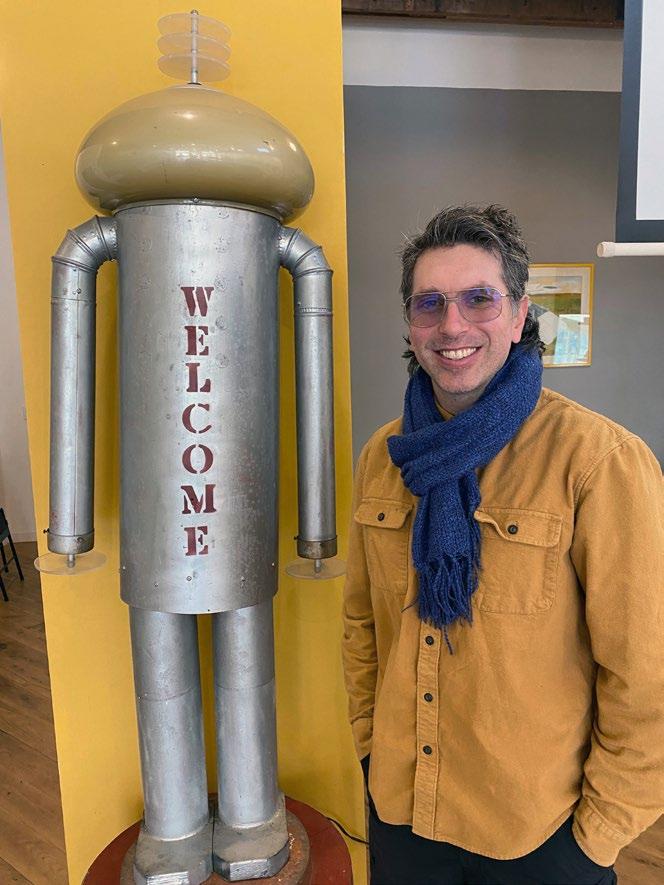
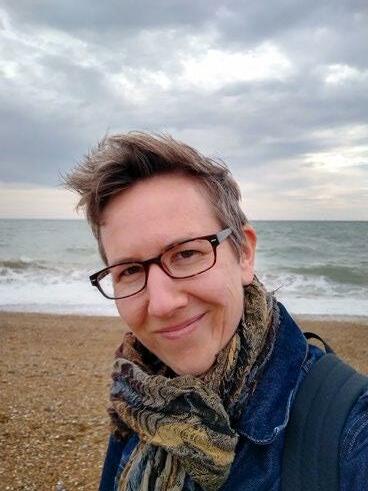
I continue to enjoy teaching for Western Washington University, where I am visiting assistant professor in the history department. I am currently developing a second book project on American counterterrorism in the 1980s and ’90s, and I am working on a community-based participatory research project with another historian and members of the Lummi Nation on the history of the Lummi Indian Aquaculture Project in the 1960s and ’70s.
Rich Cloonan ’76 reports: I graduated in May 1976. Following graduation, I worked in retail. In January 1978, I accepted a position with the FBI in Boston. After a short orientation, I went to the FBI academy in Quantico, Va. I was trained as a surveil lance specialist and returned to the Boston field office where I supported national security and organized crime investigations. In August 1981, I accepted a special agent position with the Naval Investigative Service (NIS), now known as the Naval Criminal
Investigative Service (NCIS) (yes, the same NCIS on TV now for 20 years). My postings were in San Diego, Calif.; Washington, D.C.; Norfolk, Va.; London, England; and Honolulu, Hawai‘i. My most notable assignments included being the NCIS senior representative to FBIHQ, where my first day was September 10, 2001. The next day, 9/11 happened and I led the Department of Defense effort in support of the FBI’s criminal investigation. I was a charter member of the National Joint Terrorism Task Force (NJTTF) at FBIHQ. Subsequently, I was the counterintelligence advisor to the commander, Indo-Pacific Command in Hawai‘i. I retired from NCISHQ as the deputy assistant director for national security. After retirement, I worked at the National Geospatial Intelligence Agency and the Defense Intelligence Agency. In 2020, my wife, Bibiana, and I moved to Lakewood Ranch, Fla. We have a daughter, Sara, who graduated from the University of Richmond and now works at Arizona State University as a senior researcher in the psychology department.
Noah Graves ’20 reports: After two years of working as a case assistant at the law firm Foley Hoag LLP, I have moved to New York to begin my first year in the JD program at Columbia Law School. I look forward to what the future may hold.
Liza Hart ’15 and Nathan Hart (Feshbach-Meriney) ’15 are both high school history teachers in South Portland, Maine. We have been working at South Portland for four and three years, respectively. We both are lucky to teach sections of the same course—early American history spanning from Indigenous history in North America through the American Civil War and Reconstruction. We are so grateful for the incredible history de partment at UMass, especially Professors Krauthamer, Nash, and Cornell, who helped us on our own paths as students of history. The knowledge and excellent instruction we received at UMass continues to serve us and inform how we teach American history to our students today.
Peggy Jablonski ’81, ’85MEd has continued leading walking tours throughout Cape Cod, guiding participants through thou sands of years of people, places, and events. She explores issues of race, treatment of Native Americans, gender bias, religious tolerance, social justice, and environmental stewardship. (For more information see capecodcaminoway.com.)
Madeline Korth (Hodgman) ’17 is working as a mental health therapist (LISW) in Cleveland, Ohio. Her practice focuses on serving LGBTQIA+ clients, and she is planning to begin certification as a sex therapist in 2023, a feat she credits to the UMass history department for letting her write a thesis on the history of sex education as an undergrad. Maddy got married in January 2020 and bought a house with her partner, Elliot, shortly afterward. They have two rescue dogs, Marty and Calvin. She hopes the rest of the class of 2017 are doing well and having a good fall!
Len Lubinsky ’65MA reports: My wife and I have retired to Manhattan. Our careers were in the Pioneer Valley. I was superintendent of Erving School Union #28 north of Amherst for 25 years and for more than 10 years founder and director of the alternative teacher certification program at what is now known as the Collaborative for Educational Services in Northampton. I am busy on boards, committees, and advisory groups but especially with advice about which Democrats to give money to, which can be found at lenspoliticalnotes.com.
David Mac Donnell ’66 has written his second book, Oyster Harbors Caddy Camp, published by Amazon. Read about the daily experiences of a teenage boy’s life at a now extinct caddy camp on Cape Cod during the summers 1958 and 1959. The boys learned many important life lessons interacting with the very successful golf members, which helped them become successful. Life as a caddy was not all work, however, as the boys participat ed in many team sports and talent night events. They had lots of energy and engaged in many hilarious hijinks after hours at camp or while visiting Hyannis and Osterville during their weekly one night out on the town. Many friendships were formed which lasted throughout high school, college, and to this day.
John Morton ’12MA reports: I just started my new position as the David H. Burton Postdoctoral Fellow at St. Joseph’s University in Philadelphia. This fall I’m teaching U.S. history and helping with a museum project at the former University of the Sciences in West Philadelphia. That institution has merged with SJU, and the new administration would like to renovate and reimagine the old USciences Pharmacy Museum. So I get to help student interns as we gather some cool old pharmacological artifacts and decide how to interpret them. I also have a whole new city of museums to which I can send my American history students, which is very exciting for me!
After working as a curator at the Long Island Museum of Ameri can Art, History, and Carriages in Stony Brook, N.Y., since 2016, Jonathan Olly ’02 relocated to New Hampshire in summer of 2022, where he is now director of collections at the New Hampshire Historical Society. Also this summer, he published his first book, Long Road to Freedom: Surviving Slavery on Long Island (Long Island Museum, August 2022).
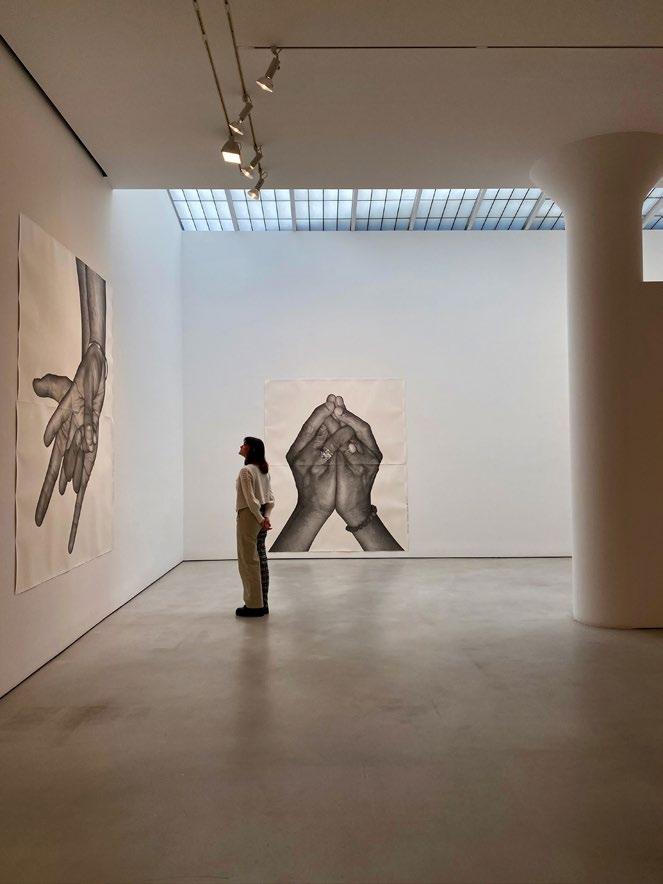
Christina Poletto ’98 is a freelance journalist and author, often reporting on real estate and design trends, and the illimitable wonders of parenting a child with a rare neurogenetic condition. Recently, she has written for the New York Times, the Wall Street Journal, the Boston Globe, Barron’s, and assorted lifestyle magazines. In 2021, Christina won two NAREE newspaper journalism awards for two real estate features. Christina is a 2021 Pushcart Prize nominee for an essay she wrote about her son’s unique disorder, which originally appeared in Blood Orange Review. Christina is also the recipient of the Parent-Writer Author Fellowship from the Martha’s Vineyard Institute of Creative Writing for 2020 and 2021. Christina is collaborating on a book about old houses across America, which will be released in fall 2023 from Clarkson Potter, a division of Penguin Random House. She lives in Brooklyn, N.Y.
Marcia Synnott ’74PhD published the article “A Contentious History of Admissions Policies at American Colleges and Uni versities: Issues and Prospects” in Higher Education: Handbook of Theory and Research, vol. 37, online and in print.
Leonard Thomas ’73 went on to get his MA at UMass Lowell in 1987 and his M.Ed at Salem State in 2005. He taught high school history from 1973 to 2007 at Billerica High, Newton Catholic High, and Masconomet High and then did long-term substituting from 2007 to 2019. He retired in Groveland, Mass., and is currently doing history presentations for libraries and other organizations. He’s married to Irene Czajkowski ’74.
Ryan Ullman ’09 reports: As of late, I was promoted to associate manager, brand partnerships with the company I’ve been with for over four years now. My first project I managed was an exciting digital partnership with a flea and tick collar company

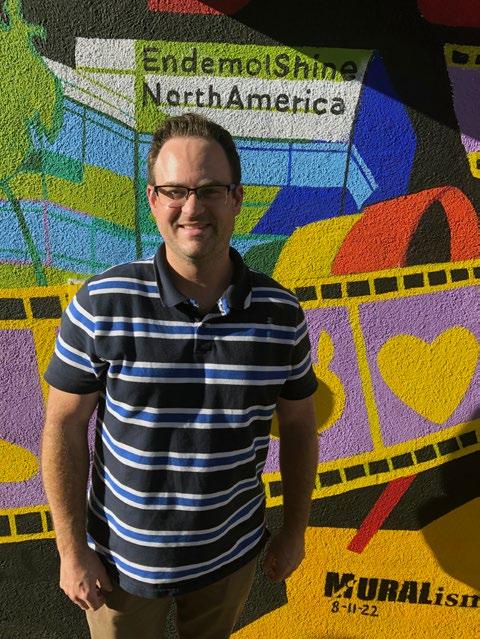
called Seresto and our globally popular animated series, Simon’s Cat. Additionally, I helped complete a successful partnership between GrubHub, one of the top food delivery services, and our hit TV series MasterChef. It’s truly been an amazing experience working and growing in these industries, both entertainment and branding. Every day I continue to learn and excel, which I find is one of the most exciting aspects of life. I very much look forward to what’s on the horizon and can’t wait to share future successes!
Mark Vezzola ’00 reports: I currently serve as the chief judge for the Pala Band of Mission Indians and the Chemehuevi Indian Tribe, two sovereign Tribal nations located in southern Califor nia. In addition to overseeing court personnel and developing court protocols, I hear a variety of interesting cases including challenges to Tribal jurisdiction by non-Indians, child welfare petitions, domestic violence restraining orders, election appeals, custody disputes, dissolution of marriages, and more. I am currently serving a second three-year term on the judicial council of California’s Tribal Court-State Court Forum, a formal advisory committee consisting of Tribal and state court judges that makes recommendations on judicial rules for matters involving the overlap of state and Tribal jurisdiction. This is a dream come true as I moved to the west coast in 2001 specifically to study federal Indian and Tribal law, earning a JD and MA in American Indian Studies from UCLA in 2005 and 2006, respectively.
Rob Weir ’90PhD published Who Knew? Roadside Revelations in Western Massachusetts with Levellers Press in the fall of 2021. Designed for a public audience, it looks at unusual sites in the region and gives historical and social background. It has met with a wonderful reception, and Rob has done several talks on the book. Weir also published his next book, which explores the intersections between American history and the films of the Marx Brothers, with McFarland earlier in 2022.
Ryan Ullman ’09.
Daniel Gordon
What Is Academic Freedom? A Century of Debate, 1915–Present. Routledge, 2022.

This book explores the history of the debate, from 1915 to the present, about the meaning of academic freedom, particularly as concerns political activism on the college campus. The book introduces readers to the origins of the modern research university in the United States, the professionalization of the role of the university teacher, and the rise of alternative conceptions of academic freedom challenging the professional model and radicalizing the image of the university. Leading thinkers on the subject of academic freedom—Arthur Lovejoy, Angela Davis, Alexander Meiklejohn, Edward W. Said, among others—spring to life.
From Brezhnev to Putin: An American Professor’s Adventures in Russia and the Soviet Union . Levellers Press, 2022. Robert E. Jones has written an account of his personal engagement with Russia and the Soviet Union over more than five decades. On twenty-six visits amounting to two and a half years of residence in Russia, he witnessed both subtle and dramatic changes under every regime
from Brezhnev to Putin. His new book, available from Off the Common Books, describes those changes and offers the informed public his interpretations of their causes and consequences.
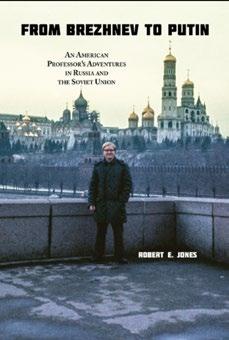
Seth Kershner, Scott Harding, and Charles Howlett
Breaking the War Habit: The Debate over Militarism in American Education . University of Georgia Press, 2022.
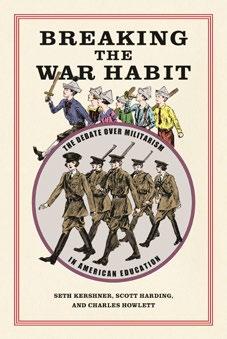
Breaking the War Habit explores the prolonged battle to prevent the military from infiltrating and influencing public education in the United States. The co-authors—including UMass Amherst PhD student Seth Kershner—highlight those who have resisted the privileged status of the military, starting with the Committee on Militarism in Education, which scored numerous victories against ROTC in the two decades following World War I. The authors also explore how, since the mid-1970s, a grassroots “counter-recruitment” movement has contested military recruiters’ largely unchecked access to high school students, raising awareness of a “school-to-military pipeline” that concentrates recruitment in urban (predominantly Black and low-income) regions.
“Chaotic Freedom” in Civil War
Louisiana: The Origins of an Iconic Image. University of Massachusetts Press, 2021.
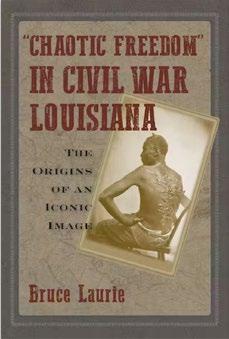
The image is terrible and familiar. A man sits, his face in profile, his torso exposed. His back is a mass of scars, baring the brutality of American slavery. This picture circulated throughout abolitionist networks and was featured in Harper’s Weekly. Its undeniable power testified to the evils of slavery. But who was this man and how did the image come to be? In this volume, Bruce Laurie uncovers the people and events involved, exploring the story behind an iconic image.
The Science of Describing: Natural History in Renaissance Europe (描述 的科学: 欧洲文艺复兴时期的自然志)
Simplified Chinese translation by Jiang Che. Peking University Press, 2021.
Translated into Chinese in 2021, The Science of Describing examines how modern natural history was invented in the Renaissance by fusing diverse traditions of medical humanism, classical philology, and natural philosophy. Drawing on published sources, manu script correspondence, garden plans, travelogues, watercolors, and drawings, the book reconstructs the evolution of
this discipline of description through four generations of naturalists, from the 1490s through the 1620s.
Prophets and Ghosts: The Story of Salvage Anthropology. Harvard University Press, 2021.
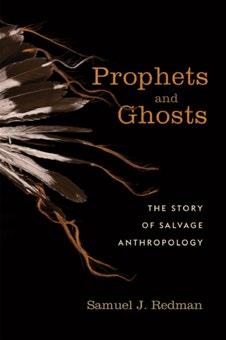
In the late nineteenth century, collectors began amassing Indigenous cultural objects by the millions, donating them to museums and universities. This salvage catalog betrays a vision of Native cultures clouded by racist assumptions that had lasting consequences. Prophets and Ghosts teases out the moral challenges and complex legacy of the salvage project. In addition to diving into the archives, Samuel Redman also interviews Indigenous artists and curators who point to new ideas on contending with this challenging inheritance.
The Museum: A Short History of Crisis and Resilience. NYU Press, 2022.

This book explores how museums have dealt with crises ranging from depression and war to pandemic and philosophical uncertainty. By diving deeper into the changes that emerged from these key challenges, Samuel J. Redman argues that cultural institutions can—and should—use their history to prepare for
challenges and solidify their identity going forward. A captivating examination of crisis moments in U.S. museum history, The Museum offers inspiration in the resilience and longevity of America’s most prized cultural institutions.
Garrett L. Washington Church Space and the Capital in Prewar Japan . University of Hawai‘i Press, 2022.

Christians have never even constituted one percent of Japan’s population, yet Christianity had a large influence on Japan’s social, intellectual, and political development. In this book, Garrett L. Washington performs a spatially explicit study on the influence of the Protestant church in imperial Japan. This groundbreaking history offers answers to longstanding questions about Protestant Christianity’s reputation and impact, but also goes further. It uses a new space-cen tered perspective to focus attention on Japanese agency in the religion’s metamorphosis and social impact, adding a fresh narrative of cultural imperialism.
Published by the University of Massachusetts Press and edited by Professor Marla Miller, Public History in Historical Perspective is a book series exploring how representations of the past have been mobilized to serve a variety of political, cultural, and social ends.
2021–22 TITLES INCLUDE: Lost on the Freedom Trail: The National Park Service and Urban Renewal in Postwar Boston by Seth C. Bruggeman
Exhibiting Evangelicalism: Commemoration and Religion’s Presence of the Past by Devin C. Manzullo-Thomas
“History Is Bunk”: Assembling the Past at Henry Ford’s Greenfield Village by Jessie Swigger
A Cultural Arsenal for Democracy: The World War II Work of US Museums by Clarissa J. Ceglio
Dan Allosso ’17PhD
How to Make Notes and Write Self-published, 2022.
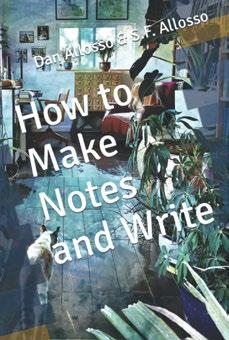
There are plenty of personal knowl edge management systems out there, promising to help you take smart notes or link your thinking or build a second brain. And there are plenty of writing guides out there promising to teach you the elements of style. This book offers a simple and effective way to make effective notes on sources and your interpretations of them, then turn those thoughts into clear and compelling output.
Daniel S. Chard ’16PhD
Nixon’s War at Home: The FBI, Leftist Guerrillas, and the Origins of Counterterrorism . University of North Carolina Press, 2021.
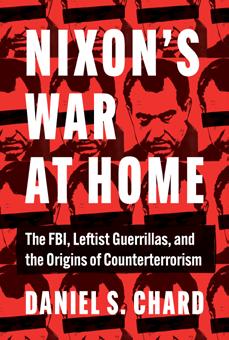
Drawing on thousands of pages of declassified FBI documents, Daniel S. Chard shows how America’s war with homegrown leftist guerrilla groups during the presidency of Richard Nixon prompted preemptive surveillance practices that would inform U.S.
counterterrorism strategies into the twenty-first century, entrenching mass surveillance as a cornerstone of the national security state. Connecting the dots between political violence and “law and order” politics, Chard reveals how American counterterrorism emerged in the 1970s from violent conflicts over racism, imperialism, and policing that remain unresolved today.
David H. Mac Donnell ’66 Oyster Harbors Caddy Camp Self-published, 2022.
Read about a teenage boy’s life at the now-extinct caddy camps that supported exclusive golf country clubs in the United States from the 1920s to 1960s. Learn about the symbiotic relationship between the caddies and the golf members—the golfers had a steady source of welltrained caddies, while the boys learned many life lessons from them. This book also follows the boys in their off hours, when they played many sports and participated in the talent night events.

Michella M. Marino ’13PhD
Roller Derby: The History of an American Sport. University of Texas Press, 2021.
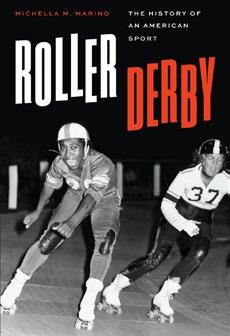
Since 1935, roller derby has thrilled fans and skaters with its constant action, hard hits, and edgy attitude. However, though its participants’ athleticism is undeniable, roller derby has never been accepted as a “real” sport. Michella M. Marino, herself a former skater, tackles the history of a sport that has long been a cultural mainstay for one reason both utterly simple and infinitely complex: roller derby has always been coed. Roller Derby draws on oral histories, archival materials, media coverage, and personal experiences.
Jonathan M. Olly ’02
Long Road to Freedom: Surviving Slavery on Long Island . Long Island Museum of American Art, History, and Carriages, 2022.
People of African descent have played an integral role in Long Island’s history, just as they make essential contributions to this region’s present and future. New York State finally abolished slavery in 1827, yet some legacies of slavery endure on
Long Island to this day. This book argues that we must both reflect on why the damaging effects of slavery have been so long obscured and honor the many contributions of Black Long Islanders to our shared heritage—through continued research, preservation, and celebration.
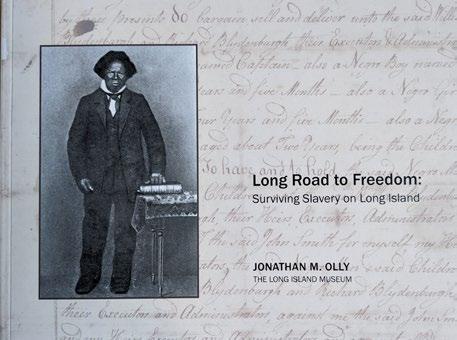 Michael A. Verney ’08
Michael A. Verney ’08
A Great and Rising Nation: Naval Exploration and Global Empire in the Early US Republic. University of Chicago Press, 2022.

Conventional wisdom holds that, until the Spanish-Cuban-Filipino-American War of 1898, the United States was a feeble player on the world stage, with an international presence rooted in commerce rather than military might. Instead, Verney argues that early U.S. naval expeditions, often characterized as merely scientific, were in fact deeply imperialist. These voyages reflected the diverse imperial aspirations of the new republic and show that the United States had global imperial aspirations far earlier than is commonly thought.
Who Knew? Roadside Revelations in Western Massachusetts. Levellers Press, 2021.
Have you ever walked, biked, or driven around Western Massachusetts and encountered something that made you blurt out, “What the blazes is that?” Have you heard regional stories whose veracity you’ve pondered? Are you looking for something new to explore? If so, Who Knew? Roadside Revelations in Western Massachusetts is the book for you. Who Knew? is a travel guide, an accessible history, and an offbeat love letter to Western Mass wrapped into one volume.
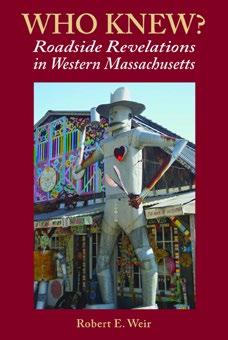
The Marx Brothers and America: Where Film, Comedy and History Collide. McFarland, 2022.
This work looks at the American past through the lens of the Marx Brothers’ films and other projects. Each of the chapters focuses on a specific film, contextualizing the world at the time and how the Marx Brothers lampooned those subjects. Along the way, the book
demonstrates what the Marx Brothers revealed about weighty topics like gambling, gender relations, immigration, medical care, Prohibition, race, and war, all leavened with offbeat humor.

In one of his last books, The First Amendment Under Fire (Transaction, 2017), then 91-year-old Professor Milton Cantor wrote the following inscription: “To Ken—For a course long out of memory and a student long remem bered.” I will always cherish this inscription by a UMass Amherst American history professor who had a profound impact on me and countless other students encompassing two generations. I benefited from three different classes taught by Professor Cantor: the basic American history class required of all incoming freshmen, American Constitutional History, and American Intellectual History. Cantor was one of three UMass history pro fessors—Mario De Pillis and Theodore Caldwell were the other two—who mentored and guided me as an undergraduate history major during the turbulent 1960s. All three were dedicated and committed to the teaching of history and all three required history majors to forge a discipline and commitment to learning.
Cantor was especially effective when it came to teaching un dergraduate students majoring in history. He did not suffer fools lightly and had little time for students who were not prepared for class or were reluctant to defend fresh new opinions. He enjoyed pressing students, urging them to think independently about history and its impact on contemporary America. Cantor viewed history as a jumping off point to challenge students about the importance and impact of myth, and the often ignored realities of our heritage. His laser-like focus on the study of history was to help students better understand how it impacted the America of today and tomorrow.
Whether he was teaching us about the Second Great Awaken ing of religious fervor in pre-Civil War America, or defending the Wobblies in the turbulent years of labor strife leading up to World War I, Cantor was engaging and provocative. He was a force of nature in the classroom—opinionated and always controversial. His teaching style and rigorous advocacy provided students a recipe for studying history. He was so convincing and enticing in his teaching style, we eagerly awaited his next classroom performance and the opportunity (at least for brave students) to engage him in debate. And he was always generous with his time, available to meet privately with students who wanted to discuss history or any other subject. He was a true mentor in the time-honored sense, ready to offer his considered judgment on any and all issues, large or small.
Cantor was a perfect example of an effective history professor who explained not only the objective facts and currents of history but added to the mix a focused personal concentration on life’s lessons learned. I salute him and, of course, the UMass history department of which he was, for decades, such an important figure.
He will be missed. Kenneth R. Feinberg ’67
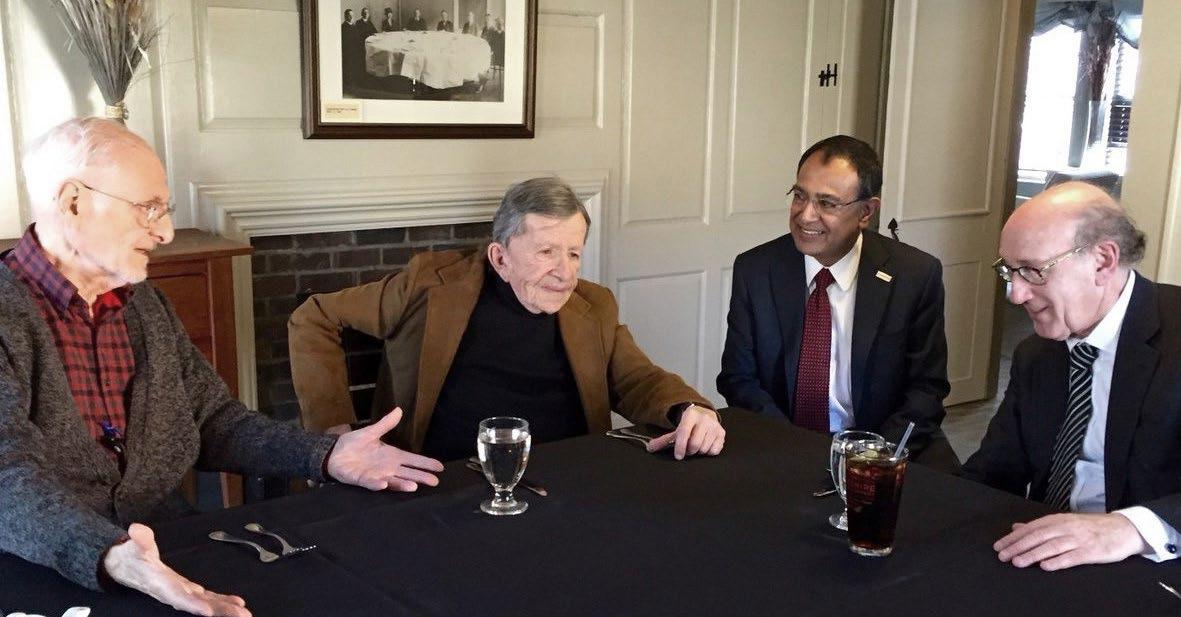
1926 2021
The UMass Amherst history department mourns the passing of Mario S. De Pillis Sr. from cancer and complications incident to old age on November 18, 2021.

The second of three brothers, De Pillis was born in South Philadelphia, Penn., on January 22, 1926. During World War II he joined the Army Air Corps, where he trained as an airplane and engine mechanic and served in the occupation of Germany as a counterintelligence agent (partly because of his knowledge of German).
Returning to the United States in 1948, De Pillis attended the University of Chicago (BA 1952, MA in history 1954). There he met Freda Rustemeyer, whom he married in 1952. In 1955 he matriculated at Yale University, taking a second MA and a PhD in American history. His dissertation won the George Washington Egleston Prize.
Coming to UMass Amherst in 1958, when it was still strongly agricultural, he rose slowly through the ranks, putting “service” before publication. He served on the first board of trustees (1960) of the Hancock Shaker Village and played a role in preserving Olana, the architectural masterpiece of Frederic Edwin Church. In 1964, President John Lederle appointed him to a committee for the establishment of a branch of UMass—now the thriving University of Massachusetts Boston. In the 1970s De Pillis and two other faculty members revised the constitution of the faculty senate to give the faculty a greater voice in governance. De Pillis, also with Michael P. Sullivan, was instrumental in the expansion of the UMass Five College Federal Credit Union from one room in Draper Hall to the various off-campus locations of today. He assisted fellow history department members Howard H. Quint and Louis Greenbaum in establishing the first honors program and for ten years he taught the first history honors course. His most distinguished student was Kenneth R. Feinberg. The honors
program recently became the Commonwealth Honors College, with its own building and almost four thousand students.
De Pillis’s major scholarly work concerned the extension of the story of Mormon communalism into the twentieth century. From 1994 to 1995 he served as the 30th president of the Mormon History Association, only the second non-Mormon to do so. He was the founder of three scholarly journals still leading their fields: the Journal of Social History (with Peter Stearns); the Journal of Mormon History (assisting Jan Shipps, Leonard Arrington, and others); and Communal Societies. He was the founder and editor of Communal Societies.
An activist in town matters, De Pillis founded the West Downtown Association in 1997 to deal with the loss of families from that area and unsupervised rentals. But he devoted most of his energy to fighting the sexual abuse scandal in the Catholic Church since 2002, working with Ann W. Turner, Joan Smola, and others to found the Voice of the Faithful. This group was instrumental in removing the bishop of the diocese of Springfield.
In 2017, De Pillis married Constance M. McGovern, a histori an in her own right. They spent their twilight years pursuing their mutual interests in historical research and writing. Returning to Europe for the last time, they traveled to Rome and to the sites of De Pillis’s international lecture stints in Munich. At home in Amherst they welcomed visitors, family, and friends from afar.
He was predeceased in 2013 by his first wife, Freda Rustemey er. He is survived by his second wife, Constance M. McGovern, his three sons and five grandchildren, and his brother Vincent J. De Pillis.
The full obituary for Mario De Pillis Sr. was published on the history department website
With profound sadness the history department grieves the loss of our colleague, Professor Kathryn A. Schwartz, who died unexpectedly in May 2022 while on leave as a research fellow at the Institute for Advanced Study in Toulouse. Professor Schwartz was a specialist in modern Middle Eastern history, with a PhD from Harvard, master’s degrees from both Harvard and the University of Cambridge, and a BA from Cambridge, where she was a member of King’s College. She was delighted to join the Department of History at UMass Amherst in 2018, and we were thrilled to have her. Her research focused on the history of the book in nineteenth-century Ottoman Egypt during the critical period in which handwritten manuscripts and printed books flourished simultaneously. Professor Schwartz published a pathbreaking article on whether or not the Ottoman sultans banned print (spoiler: they did not), in which she successfully demolished years of inaccurate scholar ship by finding the sloppy work of an early author upon which even careful later scholars had had to base their suppositions. This brilliant piece presaged the arguments she was further de veloping in her eagerly awaited first book, “Print and the People of Cairo: A History of the First Arabic Print Culture Through the State and Society That Fostered It, 1798–1882.” It seems unlikely now that this will ever be published. She also had a passionate interest in Arabic cryptology and published two articles on the topic, one of which she wrote while still an undergraduate.
Although she was in the early stages of her career, Professor Schwartz impressed the department with her rate of publication, which included important contributions to the leading journals
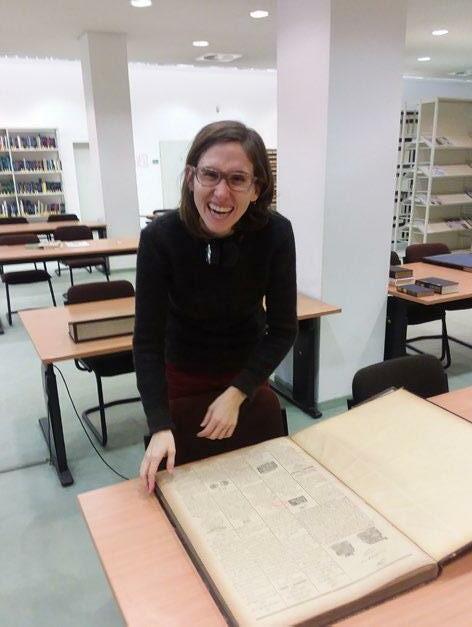
in her fields, namely the International Journal of Middle East Studies and Book History, as well as the prestigious History Compass, which serves all historians regardless of specialization. As a scholar Kathryn was also undeniably collegial, as seen in her enthusiastic collaboration with others. One project of which she was particularly proud was the website that she co-authored with Adam Mestyan of Duke University, “An Egyptian Sheikh’s Literary World: Digitally Reconstructing Islamic Print Culture Through Mustafa Salamah al-Najjari’s Book Collection,” 2018 (https://anegyptiansheikhsliteraryworld. umasscreate.net).
As Professor Schwartz’s mentor, senior colleague in Middle Eastern history, and friend, I remember enjoying regular lunches of tuna poke bowls in the Blue Wall café on the UMass campus. At these lunches Kathryn routinely found some sneaky way to pay the bill, even when it was my turn, and no matter how hard I tried to forestall her. This was a sign of her mischievous and playful side, and her love of jokes and games. Her friends and family knew this side of her well, and it is a great regret that we in the department will never learn it better. It would have been a mark of honor to be on the receiving end of more of her practical jokes.
Professor Schwartz’s students remember her fondly for her outstanding kindness, her laser focus on their learning, and her unwavering commitment to their success.
Although we are grateful for what time we did have with her, it was nevertheless far, far too short. She leaves a beloved husband and daughter. Anne Broadbridge
The Department of History is grateful for contributions from alumni and friends. Your generous donations support vital scholarships for graduate and undergraduate students, faculty and student travel for research, and the various events and initiatives that make studying history at UMass Amherst such a robust and meaningful educational experience. We sincerely thank you. The following list includes those who made donations between July 2021 and June 2022. Gifts can be made online at: umass.edu/history/give-history
Barry M. Alman
Atty. Melvyn W. Altman
Glenn H. Andersen
Jennifer S. Andersen
Erin M. Anderson
David M. Aronson
Roger A. Atwood
Alexander B. Austin
Alexander J. Austin III
Judith J. Austin
Matthew P. Bannon
Guy B. Barnett
Kristi N. Barnwell
Michael B. Barrett
Judith A. Barter
Albert H. Belsky
Susan K. Belsky
Denis Binder
Judith A. Boucher-Cameron
Joye L. Bowman
Marcella W. Bradway
Jeffry Alan Bradway
Pamela E. Brooks
James E. Buchanan
Sylvia M. Buchanan
Robert J. Burgess
Estate of Mary Jane Burke
Kathryne A. Burns
William J. Busby
Carole G. Buzun
Thomas P. Campbell
Patricia M. Campbell Malone
Paul E. Canham
Brenda D. Canter
Gerald L. Canter
James J. Carnivale
Erich C. Carroll
Jill K. Carroll
Richard A. Carter
Michael C. Cass Ashley E. Charles
Conrad E. Charles
Lawrence F. Chenier
Lee S. Cherenson
Barbara Ciolino
Richard L. Cocivera
Atty. Bruce E. Colton
John J. Connors, Jr. John S. Courtney
Allen J. Davis
Fausto DiTullio
Rosemary A. DiTullio
Joseph F. Dillon Jr. John J. Donahue
Dana L. Dorman Gail E. Dorsey
Clinton G. Dougan
Jean Dougan
Julia M. Driscoll
John Echternach
Russell H. Edes
Paul F. Ellis-Graham
Akara Elsbach
Judith Englander
Atty. Norman A. Erlich
John D. Faibisy
Kenneth R. Feinberg
James R. Finkle
Eric K. Forgo
Julianne C. Forgo
Lee W. Formwalt
Robert F. Forrant
Jane E. Forsgard
Andrew D. Frieze
James E. Gage
Carolyn Galambos
Lt. Col. Wayne G. Gallant (Ret)
Anita Garoppolo
Michael D. Gerry
James L. Gmeiner
Gerard Golden, Jr. Jeffrey L. Goodwin
Richard J. Goulet
Hilda B. Greenbaum
Cheryl L. Grenning
Joshua P. Grey
Michael J. Grossman
Stephen J. Gulo Jr.
Flora M. Guzik
Richard J. Guzik Hachette Book Group
Beth A. Harding
Julia M. Hartford
William F. Hartford
Harvard Outdoor Power Equipment
Kristin L. Hayward-Strobel
Atty. Stuart S. Heller
Lawrence G. Herman Douglas J. Hersey
Jennifer N. Heuer
John E. Higginson
John V. Hogan Jr.
Barbara Kamanitz Holland
Marguerite E. Horn
Charles R. Huse
Charles K. Hyde
Brad C. Iversen
Mary A. Jablonski
John R. Jackson
Justin F. Jackson
Ashley L. Jahrling Bannon
Frank E. Johnson III
Mark J. Kanuck
Daniel H. Kenney
Eric P. Knight
Janet A. Kopec
Jeannette L. Kuske
Kenneth K. Kuske
John F. Kutolowski
Robert S. LaRussa
Linda J. Lamont
Peter T. Lamothe
Lawrence J. Lane Jr.
Joanne T. Laptewicz-Ryan
Audrey L. Larvey
Bruce G. Laurie
Leslie T. Laurie
William M. Lavallee
Andrea L. Lavender
Jeremy L. Laverdiere
Rachel Lavery
David A. Lawrence
Brenda J. LeBlanc
Sean T. LeBlanc
Francis J. Leazes Jr.
Kristina M. Lentz Capano
Marc J. Lerman
Mary H. Levine
Mike J. Levins
Eric N. Lindquist
David A. Long
D. Mark Loveless
Kathleen A. Loveless
The Honorable David A. Lowy
Leonard J. Lubinsky
Catherine E. Luther
Patrick E. Lynch
Paul E. MacDonald
Charles H. MacPhaul
John M. Macuga
Margaret Macuga
Sharon G. Macuga
Stephanie J. Maher
Mark E. Manville
Amanda C. Mawn
M. Marie Maxwell
Brian F. McCabe
Richard J. McCraw Jr.
Kerry R. McDonough
Atty. Kevin L. McDowell
Dorothy McFarland Gerald W. McFarland
Lucy A. McGovern
James P. McMahon
R. Michael McSweeney
William E. Mercer
Barbara D. Merino-Mayper
James A. Miara
Robert D. Moran
R. David Myers
The Honorable Robert D. Myers
Tomoko Naito
Tomonori Naito
Alice Nash
Atty. Joan M. Norman
Katherine Novick
Stuart J. Novick
Kathleen B. Nutter
Lawrence E. O’Brien
Thomas F. O’Brien
Edward J. O’Day Jr.
James P. O’Keefe
Malcolm J. O’Sullivan
Brian W. Ogilvie
Jonathan J. Oliver
Jared T. Orne
Lawrence W. Owens
Laura E. Pagington
Andrew J. Paraskos
Bradley A. Paul
Renaldo E. Payne
Atty. Richard E. Pierce
Charles W. Pieterse
Felicity Pool
Mark A. Popovsky
Ericka S. Prew
Thomas L. Prew
Andrea B. Price
Barry M. Pritzker
Dennis C. Quinn
Joseph Quintero
Cynthia J. Redman
Maryanne Reed
Ryan D. Richards
Elizabeth R. Rogers
Patricia R. Roper
Barbara N. Ruchames
Robert M. Ruchames
James F. Scharfenberger
Susan A. Scharfenberger
Vincent F. Shea
Dorothy Shea
Brendan D. Sheran
Ralph J. Simmons
David N. Skolnick
Christopher M. Small
Brian H. Smith
Ralph L. Snow
Atty. Stephen E. Spelman
Theodore A. Spevack
Richard W. Sprague
Reverend Ian F. Steeves
Christoph Strobel
Kenneth C. Sullivan
Debra F. Taylor Kent J. Taylor
Sharyn M. Taylor
Charles E. Tebbetts
Lisa Y. Tendrich Frank
Allen S. Torrey
Stanley P. Tozeski
Mark A. Vezzola
William M. Walt
Stephen J. Walz
Daniel J. Ward
Graham D. Warder
Kazue O. Watlington
Paul B. Watlington III
Lt. Col. Peter J. Webber, (Ret.)
Peter H. Weis
Glendyne R. Wergland
Lee R. Whitaker
Anne C. Wing
Norman S. Winnerman
Helen M. Wise
John T. Wolohan
Nicole Wolohan
Chia F. Wung
Shira B. Yoffe
Andrew G. Zehner
Robyn L. Zelnick Nancy J. Ziemlak
ON THE COVER
PhD student María Belén Portilla Moya explores historical maps of South America at the Robert S. Cox Special Collections and University Archives.
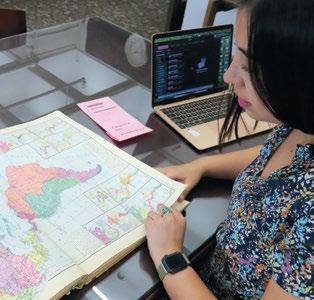
Past, Present & Future is published annually by the Department of History Herter Hall
University of Massachusetts 161 Presidents Drive Amherst, MA 01003-9312
EDITORIAL
Tirzah Frank, Co-editor
Jess Johnson, Co-editor
Nick DeLuca, Contributing editor
Alison Russell, Contributing editor
Allison Smith, Contributing editor with Brian Ogilvie
Samuel J. Redman Heidi V. Scott Joel Wolfe
DESIGN University Marcom Group
We’re always interested in getting updates from our graduates.
Email us your news at: communications@history.umass.edu.
Be sure to include your graduation year and degree, and we’ll be happy to include you in our next newsletter. If you have high-resolution photos, include them as attachments.
Check out the history department’s YouTube and SoundCloud channels to see and hear a sampling of our department’s public talks: youtube.com/umasshistory soundcloud.com/umass-history This marks the ninth year of our department’s blog Past@Present, which features posts by faculty, students, emeriti, and alumni. Follow us at: umasshistory.wordpress.com
If you would like to give to the department, simply visit: umass.edu/history/give-history or send a check made out to “UMass Amherst” to: Records and Gift Processing Memorial Hall University of Massachusetts 134 Hicks Way Amherst, MA 01003-9270
Be sure to note “Department of History” on the memo line. We appreciate your support!
 Teaching assistants Katlyn Durand and Seth Kershner brought students in Christian Appy’s Social Change in the Long 1960s course to Special Collections and University Archives for an immersive primary source experience.
Teaching assistants Katlyn Durand and Seth Kershner brought students in Christian Appy’s Social Change in the Long 1960s course to Special Collections and University Archives for an immersive primary source experience.
Department of History
Herter Hall
University of Massachusetts
161 Presidents Drive Amherst, MA 01003-9312
umass.edu/history
Public history students gather during the 2021 fall field trip to Old Sturbridge Village—one of the first in-person experiences many of them had. See page 14 for more public history program news.
